#it's like a shortcut for getting your audience to root for a character without taking a risk in making them unlikeable
Explore tagged Tumblr posts
Text
remember in death note netflix live action where instead of saying "no you can't kill shinigami with the death note, DUH" they for some reason decided on "you COULD, but no one's good enough at SPEED-WRITING to actually manage it before he kills you FIRST. can YOU beat the #DEATHGODSPEEDWRITINGCHALLENGE?" because the problem with death note all this time was lack of competitive speed-writing and then it didn't even come up not even at all
#i do feel like mainstream western media demonstrates this need often to turn whatever supernatural/divine#force in the story its adapting or telling into something tangible and defeatable or understandable#and i get it and it works sometimes but other times it really defeats the purpose that that entity is meant to serve#like this movie wants ryuk to be villainous because he's a big fun monster and it's easy you know#that makes it so light is mostly just a really smart and misguided guy being led around by evil monsters and women#it's like a shortcut for getting your audience to root for a character without taking a risk in making them unlikeable#but ryuk isn't the villain. he was never a villain. he's a narrative force more than he is a character. he's a symbol.#it takes so much away from the story to take the weight off light's shoulders and give them to willem dafoe.#same shit happens in classical retellings where like. god ok so the villain is hades now#or! subversive! it's zeus! ooooooooo#add in a bunch of mythical monsters that weren't there because the spectacle makes it easier#godforbid we confront that these forces are only here to stand in for abstract challenges like our own natures#you cant kill shinigami because theyre forces of nature they're the power you wield which you can never really hold#UNLESS ☝️ you write real fast#rookposting#im not even fucking tagging this as dn nobody needs to see this it's not about anything#rookthots
88 notes
·
View notes
Note
More Twitter nonsense.
"Rand has no connection with Tam in the show."
"Rand's relationship with Tam is so central to his character and his development that he feels like a different character without it."
Like...what? It's not missing we just didn't get as much of it as we would've liked. And how is he an entirely different character than book Rand? I hate this idea by the fandom that Rand is an entirely different character than he is in the books cause they didn't include this one specific thing. Rand is probably one of the closest adapted of the EF5 imo
rand's relationship with tam in the books is just a few scenes in book 1, the very occasional thought in books 2-11, and a few scenes in books 12-14. it's not that much! i remember spending much of my readthrough going "okay the rand-tam relationship is sweet but why does it get THIS much love in the fandom? it's barely been in the story at all after the first book?" their relationship is significant to rand's character arc only in books 1, 4, and 12, and even then, only book 1 has it as a book-long theme whereas it just comes up briefly in 4 and 12, but in 12 its brief relevance happens to be as part of rand's biggest turning point in the series, which makes people remember the relationship as being a lot more significant to his overall story than it actually is imo.
if you take all that and adjust it proportionally for the 4 million words:64 hours book:show ratio, then yeah, that's not going to work out to be all that much screentime. the show has and will continue to fit in what they can for that relationship, but it has rightfully deemed rand's relationships with his fellow primary characters as more important to the overall story than his relationship with tam, who is a secondary or tertiary character. and that's the case in the books too; i'm fond of the rand-tam relationship but it 100% is overhyped and isn't nearly as big a part of the story as people think it is.
plus, the thing that's "central" to rand's character arc is the idea that his upbringing and his roots in the two rivers have shaped him into a good, humble man who can succeed where LTT and his arrogance failed. in the books, the rand-tam relationship is one of the vehicles for that, but it's that broader idea that's important rather than the specific relationship. all the show has done is shift the focus to use the EF5 relationships as the vehicle for the very same idea, since the EF5 relationships are a much larger and more constant presence throughout the story than the rand-tam relationship. it was a good narrative choice for a time-constrained medium that must tell the story as concisely and efficiently as possible (the rand-tam relationship only serves this 1 theme & function, but the EF5 relationships serve many themes & functions and serve multiple main protagonists' arcs instead of only rand's, so you get more bang for your buck with them, so to speak). but a lot of book fans really struggle with the idea that the show can and does convey the same themes and emotional beats using different scenes/characters/relationships/etc, and so many Show Complaints stem from that inability to see the forest for the trees.
(also! it's very easy to "shortcut" parent-child relationships because the audience has a prebaked assumption of how deep such a relationship is and we thus don't need to spend much screentime showing its depth. for example, rand and tam had only a couple scenes in s1, but my show-only mom was very emotional when tam asked about rand in nynaeve's test in s2! i don't doubt that if the TGS scene were to make it into a later season, it would hit very hard for her regardless of how much time was spent on that relationship in prior seasons.)
28 notes
·
View notes
Note
I apologize for the length of this in advance but I need to nerd out here for a moment. I love that you covered Bill and Frank because it very much reminded me of a point I have always made about Buddie scenes.
So if you watch TLOS, it's a mix of gamers and casual viewers. I watch with my BF and a group of friends and I am actually the only one who played the game. Now in the game I always thought Bill was gay, but we never even met Frank. He's already gone and their relationship is presented very differently. In fact the notion that Bill could be gay was a huge controversy in the gamer discourse.
On to when the actual episode aired. Unless you know all this, it can't be fully appreciated what this show accomplished. From casual viewers to those aware of the source material like me? The showrunners accomplished completely removing us from the world, the threats, introduce 2 character you have never seen and tell a 17 year long love story about them without me, fully processing we are in a different universe. Also add you had to make me understand and almost root for the suicide at end and not even be mad. How could they accomplish it, I truly believe it was the scenes, the lighting. There was no wasted space. We bridged 17 years knowing what happens without being beat over the head with it. Frank wasn't with Bill because of running water and hot food. Bill wasn't with Frank because he's lonely. The fact that their marriage scene is no dialogue, yet I get it, and I am bawling like it's masterclass.
So the Buddie aspect. It's always been the same for me. It's the filming and attention to details that show the love, but also alert me to like I need to pay attention. When Buddie goes Canon I feel like a large part of the audience will go oh yeah it all makes sense now. It's sad that in queer storytelling it can't be more obvious, but hopefully in a few years that will change . However again when it comes to showing Buddie as family there has never been wasted space or shortcuts in their scenes.
Does that make sense or am I being a romantic clown.
Oh one more thing. If you didn't watch all of TLOU, Tessa (the girl from the garden lunch is a perfect example of why Bill and Frank were beautiful. Because the Tess we know in the present day wasn't the Tess you saw giggling with Frank. It proves how Bill was able to protect Frank in a way Joel couldn't with Tess.
Hi Nonnie! Thank you so much for sending this ask referencing the gifset I made paralleling Buddie with TLoU's Bill and Frank.
Okay, I am going to start from the end and point out that I LOVE that comparison you pointed out of what Bill managed to do for Frank, versus where Joel couldn't do the same for Tess. But Bill did more than that. Bill could protect Frank because he was naturally a hermit. It didn't require effort for him to shit the rest of the world off and build defenses against it. He was doing that even before the apocalypse hit. What's truly amazing about Bill's love for Frank is the moments it allows any openness in Bill. First to Frank himself, to letting him in, talking to him, sharing personal stuff, playing his favorite song for Frank and letting Bill's own pain be present and seen. That's the moment Frank falls in love with him, after all. It's when he sees that and he wouldn't be able to if Bill hadn't chosen to be open and vulnerable with him.
(just take a second here to consider how much this reflects Eddie, who chooses to be open with Buck as early as 202, sharing Christopher's pic, letting Buck into their lives, and then letting Buck in on the pain and the vulnerability during his breakdown arc starting in 513)
Then there's the fact that Bill DOES NOT want to have other friends. He doesn't want Tess there, he doesn't like Joel, he would never have let them in no matter how many advantages friendship with smugglers may offer. But he accept their presence because Frank wants it. That's love. Leaving your comfort zone, making room for what the other person needs.
(don't think about Eddie not wanting to go to the horse ranch in 514, but agreeing to just in order to humor Buck, not even realizing how much this in turn is actually going to end up helping him)
But I wanna add something to all this. I heard Tess and Joel's relationship was discussed and what TLoU ended up going with is them being lovers, but never explicitly stating it. And I think that's SO interesting. 'Coz that means you can easily see some of the same tropes we see with Buddie happening with Joel and Tess as well. They're life partners, and we're never told in what way, but it is implied, and we're meant to pick up the hints and figure it out for ourselves, it explains their dynamics in ways that platonic friendship/business partnership does not. One trope, for example, is the parallel of the subtextual relationship to a canon one. Bill and Frank are canon. Tess and Joel are subtextual. Yet we have basically the same line from both Tess and Frank uttered at their partners: in 102, Tess reminds Joel she has never asked him for anything before, and in 103, Frank does the same with Bill.
(Buddie and every freaking piece of meta I've ever written about them paralleling every single one of 911's canon couples, like in the Buddie vs Lone Star meta posts, or the parallel with Madney in 512 or with Henren in 606...)
Thank you for this! Have a great day, lovely! As always, here's my ask tag. xoxox
#buddie#911meta#buddie meta#911 meta#9-1-1#evan buckley#eddie diaz#edmundo diaz#evan buck buckley#the last of us#frank x bill#bill and frank#ask#anon ask#911#911onabc#911 on abc#911abc#911 abc
18 notes
·
View notes
Text
Deathloop sure is a video game
Every October, there's pop-up entertainment venues like "haunted houses" (or other haunted attractions) that attempt to artificially recreate the motifs common in horror movies, complete with live actors who are dressed as vampires or zombies or serial killers or whatever who leap out and scare the guests who squeal in delight, if only because it gives them an excuse to tightly cling to their partner. It's more exciting than going to a horror movie, because it's a more tactile experience, so you're mostly just there to experience the various horror motifs without being concerned about a plot.
The thing is, there are actual horror movies that are set in haunted attractions. And while this does make for some fun early reveals (like when the teenagers laugh at the knife-wielding man who they assume is an actor and part of the attraction, only to realize that he's actually a homicidal madman), the very idea of a horror movie set in a haunted house kind of feels like cheating. Haunted attractions are, in a way, a simulacrum of a horror movie, which I suppose is an odd thing to say considering that haunted attractions are real and the events in horror movies are not, but I think that is the main level on which most haunted attractions are designed: a haunted attraction is a "horror movie IRL," so to then make that the setting of your horror movie “horror movie IRL but in a movie” is like a simulacrum of a simulacrum. It’s shortcutting past the part where you would ordinarily come up with some kind of lore-based explanation for why the teenagers are hanging out in a creepy house and why there’s a demented killer or vampires or whatever who are trying to kill them.
I sort of feel this way about one of the first levels I played in Deathloop, which is a video game both in medium and form. It's a bit like Dishonored (one of Arkane's earlier titles) in the sense that the core objectives boil down to identifying an assassination target, and hunting them down in their mansion or laboratory or whatever. The first target I assassinated was a fellow by the name of Charlie Montague, who is obsessed with games, and has populated a section of the world where you can speed-run an obstacle course to be rewarded with a gun, because this is a first-person shooter video game that is set on murder island, where everyone's favorite hobby is killing each other because they’re in a timeloop where everyone will revive the next day. However, when I found Charlie Montague, he was in the middle of a LARP session. This is literally how the game describes it: Charlie is hosting a game where he invites guests to participate in a game somewhat akin to a murder mystery, or maybe more like Among Us. When I arrived, Charlie announced over the loudspeaker to all of his guests that the killer monster (me) had arrived, and the objective was now for them to hunt me down. (I, for my part, did my best to avoid the guests, but I had to gun down the entire party before finally getting to Charlie at the top floor.)
So, this is a video game level that felt very much like a video game level. Which I don't really mean as a knock against it -- it was a fun environment, I had fun hunting down the game designer Charlie Montague and murdering his LARPing buddies, and the environment was set up in a way that made the confrontation with Charlie himself interesting, since Charlie possesses the blink power that lets him teleport across gaps and between floors. But it kind of feels like cheating to have a video game level where the setting premise is, as explained by the game's fiction, literally a game created by a game designer (as opposed to trying to sell you on the idea that the level you're traipsing through is just some rich dude's mansion, or a military base, or whatever). It is the video game equivalent of setting your horror movie in a haunted house attraction.
As an Arkane Studios fan (who started with 2006's Dark Messiah of Might and Magic, and counts Dishonored among my personal top 10 games of all time), I quite enjoyed Deathloop. But it is by far the most video game video game that they've ever released.
Games like Dishonored and Prey (2017) exist in what is sometimes described as the "immersive sim" genre, where there's a big emphasis on player choice and giving the players a bunch of tools to approach objectives without giving them a prescribed route through the game. Dishonored pushes you in the direction of being stealthy and quiet (with a "chaos" system that causes the world to become more desolate if you kill too many enemies in each level), but there are many routes through the levels -- and sometimes, you'll find your way to an objective through what feels like it isn't a prescribed "route" at all. The objectives are often quite simple -- "infiltrate, kill a dude, exfiltrate" -- but a level that could be completed in just a few minutes might take an hour to complete the first time you play it as you spend time scoping out the target, gradually getting a feel for the environment and learning which parts of the level have lots of enemies and which parts are safe and easy to stealth your way through.
The immersive sim's emphasis on carving your own way through levels leads to a phenomenon where a lot of the progression that you make is "meta" progression that exists entirely outside of your avatar -- you might spend an hour prowling around a level, and your character hasn't gotten any stronger (apart from maybe finding a few optional collectibles), but you as a player have "leveled up" to the point that you now know the level like the back of your hand, which is how you have people who spend hours exploring a level in Hitman so that they can do a perfect 5-minute speedrun of that level.
Sometimes, this sense of "meta-progression" is further emphasized by making some of the collectibles information that you as a player can store. I remember a part in Dishonored where I found a locked safe, and I had to root around the game environment and find the code to the safe before I could come back and get the goodie inside. But if I wanted to, I could write that number down so that on any subsequent playthrough, I could just go right to the safe and open it right away -- which feels a bit like cheating, but it's no less cheating than sprinting through a specific route through a level because I know from previous playthroughs that the path I'm taking has no guards.
Deathloop isn't quite like that: the game is filled with combinations and whatnot (in one "puzzle" I had to insert specifically-labeled tapes into a machine in a specific order), but all of these are generated randomly: you can't take that information with you across playthroughs, and you can't look the number up in a walkthrough like some older immersive sims would let you do. But Deathloop takes this meta progression and makes it actual progression: it's a time-loop story, and your character (Colt) remembers everything that he encounters across playthrough, so when you find the combination to a door, Colt will make a mental note of it (no need to bust out your pen and paper), and the next time you come to a locked door that requires that combination, you don't even have to punch in the numbers: just hold the triangle button on your Playstation controller and Colt will automatically punch in the numbers that he learned during an earlier loop.
Deathloop is full of little things like this that, on first glance, almost just feel like QoL improvements. But there's something that feels very different about how things are done in Deathloop: in gameplay terms, it basically boils down to, "Go to this place and press square to read the password, then go to this other place and unlock the door," which is really not that different from "go to this place and press square to pick up the key, then go to this other place to unlock the door." The "passwords" that exist throughout this game are basically just keys that Colt can store in his brain and take with him whenever you advance to the next loop.
And to be clear, that's not necessarily a *bad* thing. In fact, immersive sims are kind of a niche genre that don't have a very big audience, so anything that helps streamline and make it more like, well, what you'd expect from a "video game," is probably going to make the game accessible to a lot more people. And they streamline a *lot* in this game. The game is all about planning the "perfect loop" where you manage to kill the 8 big baddies in a single day, and everything before that point is just preparing for that final loop. Even though that seems like an abstract thing that might require you to hold a bunch of disparate information in your head, the game is actually *really* good at making it so that Colt is already mentally mapping out the game plan as you go, to the point where you can just go into the quest book, select a thread, and then just follow the waypoints. Colt is planning for the "perfect loop" and collecting all the information he needs (including passwords, and memorizing information about how to get certain bosses to go to certain areas where they'll be vulnerable), and Colt is so good at remembering these things that the player never has to: you can play the entire game from start to finish just by traveling from waypoint to waypoint and stealthing or shooting your way past anything that stands in your way.
That is, of course, incredibly reductive. The process of getting from point A to point B in Deathloop is fun for the same reason that getting from point A to point B is fun in any other game. The guns feel good to shoot, the levels are interesting to navigate, and the game lets you earn the ability to take certain pieces of gear with you between loops so it always feels like there's forward progression. But I think that there's a critical thing that's missing:
Immersive sims aren't just about getting from point A to point B. Before you can get to point B, you have to discover where point B is. *Where* in this mansion is the assassination target? Better spend some time skulking around and listening to his staff gossip about his daily habits so you know which parts of the mansion he's likely to appear in. Oh wait, I don't want to just get in the same room with this guy, I want to get myself in the same room with him *when he's not surrounded by his guards*. How do I do that? Better do some more snooping. And in a sense, Deathloop *sort* of does this. Before you can follow the waypoint objective marker to your target, you have to find out where they are. But the "find out where they are" is often, "follow this *other* waypoint objective marker to find the slip of paper that tells you where they're going to be, at which point you can follow the waypoint objective marker to their exact location!"
And to be fair to Deathloop, it's not *all* like that. There are some times where the game sort of just points you in the right direction and leaves you to figure it out, like one dude who has hosted a masquerade party where he and his guests are all wearing the same masks, and so you have to figure out a way to ferret him out. (Or you can just murder everyone at the party to figure it out by process of elimination -- which is actually much easier said than done, because this is murder island and everybody is packing heat, and this is an exclusive party so his guests are the type of people who carry around heavy weapons.)
Another way that Deathloop takes the "meta progression" inherent to immersive sims and makes it explicit in-game progression is by having a time loop where you can encounter and kill the same targets over and over again. That's the kind of thing that tends to happen in immersive sims across multiple playthroughs -- Hitman doesn't *require* you to play each level multiple times, but you generally want to, because each level is filled with tons of different routes to explore and different ways to deal with each of the targets. But that's all on the player: it's not as if in the fiction of the Hitman universe, Agent 47 is repeatedly murdering a bunch of people who magically revive so that he can kill them again, whereas in Deathloop, that is very explicitly what is happening.
The thing is, because Deathloop is kind of designed with the assumption that you'll kill each target multiple times, the first time you encounter them and blow their head off, it doesn't feel like the grand emotional climax. In fact, in a way, it feels like the *start* of a relationship. "Goodbye, Charlie Montague. I hardly knew ye. But I'm sure I'll know you better by the third time I'm leaving your LARPing session with that slab upgrade you're carrying." I feel like that robs the kills of some of their impact, and maybe that's just inherent to what kind of game this is: in Dishonored, you feel as though over the course of a level, you get to know your target as you snoop through their quarters, overhear what their staff have to say about them, read the journals of their rivals while looking for possible weaknesses, and so on. Because it's a stealth game, it makes sense to hide in the background and learn about their life. Stalking a character through a level while waiting for the perfect opportunity to strike can actually feel incredibly intimate, because as the eponymous Visible Man in Chuck Klosterman’s novel says, to truly know who someone is, you have to see them when they’re alone at home; their behavior anywhere else is just a performance.
But when I'm chasing down Charlie Montague with an SMG in one hand and a pistol in the other, the only thing I really know about him is what he's announcing over the loudspeaker. (I don't really remember exactly what he said, but the subtext is that he's mentally unstable, and he's obsessed with games.) And even though Charlie Montague was shouting at me what kind of person he said, I feel like I never really got to *know* him like I got to know some targets in Dishonored. In fact, the moments when I got to know Charlie best weren't when he was yelling at my over the loudspeaker as I ran through his level as Shooty McFPS guy, but the moments when I got to read his notes or chat correspondence (which is *entirely optional*, because even if I don't learn the relevant facts from Charlie Montague's notes, Cole will -- and he'll verbally narrate the cliffsnotes version of them as I'm headed to the next objective)
Despite feeling like a clear descendant of Arkane’s earlier titles, Deathloop feels neither "immersive" nor "sim." It's constantly doing things that remind me that I'm playing a video game -- which, to be clear, is not a bad thing! It’s fun to be Shooty McFPS guy without worrying about hiding guards bodies or making noise. More than any other Arkane Studios game, it does everything it can to minimize player frustration, whether that means feeling lost, or feeling like you're not making forward progress, or feeling like your progress is being gated by a huge spike in difficulty.
Dishonored is a game that rewards patience. This is one of my favorite things about it, but the fact that it rewards patience so generously means that it also *asks* patience of the player in order to get its best moments, which means that some players will never experience them. Deathloop asks very little from the player. Deathloop is a very "even" and "smooth" experience, but that's both for better and for worse. The lows aren't as low, but the highs aren't nearly as high. Deathloop is a good game. And it will probably be a "good game" to a greater number of people than Arkane's previous titles, but it didn’t have nearly the same impact on me.
Anyway, more than anything, my time with Deathloop has convinced that I should go back and play Prey (2017).
#deathloop#arkane studios#I apologize for such a long letter#dishonored#prey 2017#immersive sim#video games
30 notes
·
View notes
Text
This was written sometime around 2015. While there may still be solid advice on here, I have to admit there are some parts I would've written differently. I am posting it "as-is," with the original text preserved, because it might help some people pero tinatamad na ako mag-edit.
"Any advice you can give to get better at poetry?"
This question has been asked of me a handful of times (most recently on tumblr), and while I never really answered it in-depth, I thought I would write something about it, once and for all. I'm not an authority on the subject, but I like to think that I write decent poems. So this will just cover some basics, which I think will help those who want to get into writing poetry and actually get shit done.
1. Avoid cliché like the plague--
First off, let me start by saying that I believe avoiding cliché is one of the best ways that you can watch your writing stand out and grow. I also think avoiding it is like any other skill in that one needs practice to be good at it.
Of course, to avoid this pitfall, you will need to know what a cliché is. "My heart is full of love that it might burst" -- that's a cliché. "Your smile is calm; it brightens up my day" -- cliché. "I would give anything just to hold your hand," -- cliché. Hell, even the title of this item, "Avoid cliché like the plague," is a cliché. Basically any line, phrase, or thought that has the air of being overused is a cliché.
As a testament to how hard this bastard is to avoid, even up to this day, I still suffer from using cliché to convey thought. I mean, who wouldn't, right? They're easily understandable, and easily-relatable. I read many people who wrote that their love is like that of the Sun and Moon, or that love is a tragedy worth dying for and everyone should be Jack and Rose and Romeo and Juliet. It's a quick way to "connect" to an audience and appeal to already-familiar feelings that reside in them. It's ready-made.
It also tends to make your poetry as stale as cold pandesal on a rainy day.
I don't know about you, but reading about how a heart was broken the same way for a hundred times over just doesn't do it for me any more. Maybe on the first read it will be nice, even cute. On the second it will still be sweet. By the tenth or fifteenth, going through a heartbreak poem littered with cliché is such a slog that reading becomes quite a burden. You may think that your poem is unique, as such that you wrote it in a room all alone with all the feelings and emotions of a heartbroken human being, but there are others who do that, too.
And I'm not saying your feelings are faked and your experience are the same as others -- they are not, and that's the point. I'm sure they are genuine, so you need a better way to express them and prove that they are unique to you, and you need to distinguish them from the common rabble.
So how do you do this? How do you avoid it?
You stop.
No, really, I'm serious. You stop yourself from writing.
Once you recognize that your line is a cliché, you stop it before it takes root in the poem. You cut it out like the unwanted weed that it is.
Then, — here comes the harder part, the one that requires you to actually think — you plant a new one.
So when you write "Your smile is calm; it brightens up my day," you think, 'Stop. Cliché incoming.' This is where your imagination and creativity comes in (funny, I seem to remember poetry falls under "creative writing" huh). Perhaps this line could do better with something like,
"Your smile is the steady hovering of a blackbird's wing above aspen — an effortless glide, as reassuring as air."
I hope you agrre that this line already does a good job of expressing the calmness of the smile, how it affects the speaker, and all without that pesky cliché looming above one's writing!
2. Love concrete nouns, marry verbs, make friends with adjectives, and kill adverbs. (also, don't write riddles)--
So once you get the hang of dodging every cliché your brain throws at you, you will need to have a lot of new stock so that you can replace the unwanted ideas. It's like taking the garbage out. You. Will. Need. More. Nouns. And. Verbs. This cannot be understated.
[Okay, quick refresher: nouns are names of things, adjectives describe nouns, verbs are words that denote action, and adverbs (sort of) describe verbs.]
You need concrete nouns and verbs most because when I said that you need to express things in more unique ways, that doesn't necessarily mean that you need to be "deep" -- just varied ("the more, the merrier!"). It's actually better to keep your poetry as simple and as easy to understand, and what better way than to use concrete nouns and verbs?
Consider Margaret Atwood's "You Fit Into Me:"
You fit into me
like a hook into an eye
a fish hook
an open eye.
— Margaret Atwood, 1971
Atwood uses very simple words ("fit," "fish hook," "eye," "open" used as an adjective) to express the suffering of being in an unhealthy relationship; this imagery is what makes the poem powerful. They "fit" in such a hurtful, perhaps even sadistic way - who would want a fish hook in their open eye?
Now, if that poem was written like,
You said you love me / but I know this is not true / You always try to hurt me / Huhuhuhu
-- then I don't think it will be as popular as it is. I think the beauty of poetry is such that you're free to explore expression; that you can express yourself in ways you have never imagined before, and that discovery is pure joy.
Why concrete nouns and verbs, then? Because they are precise. Because they can easily evoke images and feelings as accurately as you want the poem to be. Remember how cliché are like that? Concrete nouns are easily relatable, too, without compromising the genuineness of your ideas. It also helps if you use more specific nouns. Don't write tree -- write "oak," or "linden." Don't say "flower,"-- say "carnation," or "chrysanthemum." Don't write "bird" -- write "robin," or "rook" (yay Sylvia Plath!). It adds more character and nuance.
Abstract nouns can be misinterpreted; when you write "love," or "sorrow," or "sadness," it means a lot of things to different people. But if you want to get your feelings across as precisely as you want, you use concrete nouns and verbs. When I write "Your love is a journey that always leaves me heavy," people can interpret it as a bunch of wildly different things. But when I write "Your love was such a journey, and I am the sleepless horse, dragging carriage," it gets a more specific point across. Everyone can imagine what a sleepless horse dragging a carriage feels like; you would not interpret the poem in any other way. Or, at least, not without the pitiful image of a very tired and thirsty horse -- which is how I, the writer, would like you to exactly imagine it (as such). Concrete nouns and verbs serve this purpose.
Why avoid adverbs? I won't ramble too long about this, as there are times that it really is unavoidable. I still use adverbs sometimes (can't help it if there's rhythm to consider).
Adverbs are words like "gently," "softly," "slowly" -- and to avoid them is just good practice in general, because adverbs are shortcuts. When I write "I wanted to touch her hair softly," I'm being lazy, shortcharging -- basically cheapening the experience. What the hell is "softly"? Readers need to know.
If you can, try weeding out adverbs in your writing. You'll find that you will stretch your mind in ways that can help you improve.
"My fingers shall be dandelions upon your hair, blooms caressing bright tresses worthy of such light and gentle innocence" -- that's how "softly" I wanted to touch her hair.
You may have noticed that in this part, I was all about getting your point across precisely. That's because most people, when new, think that poetry is all about being enigmatic. This is like me in the past, like using obscure words and writing "mysteriously" make for the best poems. No! It's actually the opposite-- it’s about letting your readers experience your emotions in a unique but very understandable way; it's a way of sharing with them the experience through phrases that would easily resonate with them!
Do not write like a riddle-maker -- if your reader scratches his head after reading your poem, then you have failed as an agent of expression.
Another point: does this mean that you have to expound and transform every single cliché and abstract idea into a concrete form that the reader can relate to? Maybe not entirely, but this decision I would leave to you as an artist — it's your call. This is poetry, after all, and you still have to consider rhythm and meter.
(I will not talk about meter and rhythm because those two are entirely different beasts and I can write volumes on them that won't fit with the general practical approach of this write-up. Although, one practical advice I could give is listen to a variety of music. Pop, hip-hop, waltz, jazz, ambient, and maybe even some metal -- those will help your head get a feel for rhythm).
3. Let it sit, and revise, revise, revise
By the time you think the poem is finished, you will get this uncontrollable urge to post it or publish it immediately (maybe in an online outlet like this one, Facebook). My advice is, don't. Just don't.
Let it sit for at least twenty-four hours, then read it again. I promise that you will see different patterns emerge; you'll find a better choice of words for a particular passage; better imagery; a better sequence; etc. Basically, you'll see your poem in a different light. Do not be afraid to experiment and revise!
You don't need to post them immediately; think of posting them in this barely new-born state as pre-maturity. They may be a bit okay, but you have to believe that they can still be better.
If at least twenty-four hours has passed and you really don't see anything you can change to make it better (of that, I'm highly doubtful), then that's the time you can say with confidence that the poem is done. You have said all you need to say. Nothing left out of that particular idea or theme anymore. Then okay, go. Post.
But like good food, poetry takes time. At least remember to let yours simmer.
4. A change of environment or writing implements will do you good
A lot of people probably exclusively write with laptops and/or phones. Maybe they use paper and pencil, too, but never for creative work (academic stuff, etc). But try it -- I know it sounds like pseudoscience or overly-emotional bull, but there is a certain… sublimity in writing with paper. There was this poem that I wrote ("Aokigahara") that was written on paper first and then transferred on laptop. It looked like this incomprehensible ramble of shit when it was first conceived, but it turned out decently — thanks mainly to the writing being a different experience than usual. Similarly, if you're one who always writes with paper-and-pen(cil), try writing a poem exclusively on a phone or computer, too! See how it turns out.
Also, this advice I would give with such pain in my heart because I don't like going out of my room, but — GET OUT OF YOUR ROOM AND GET SOME FRESH AIR YOU MEME-INFESTED FHFJASGFKAHASAHJAH
There.
5. Read a lot of poetry
Kailangan pa bang i-memorize 'to? Read, read, read. Aside from learning a lot, you will find that voices matter, and everyone's voice will help you grow. Read the classics. Read contemporary. Read beatnik stuff. Cry to "Ang Huling Tula Na Isusulat Ko Para Sa'yo" for the last time, decide that while it is a good spoken word piece we should not all emulate it because that will make for a homogeneous poetry community and that will suck balls because everyone will be crying and everyone will want to die. Then watch slam poetry. Admire people. Be inspired. Everyone's voice matters (except those who still cling to cliche because they neglected point number 1). Which brings me to my last point:
6. It is not a contest
If you feel bad when you think someone's writing is "better" than yours, or that you find yourself jealous at how some people use words better than you do, then you're not writing in the right attitude, (wo)man. It's that simple, you're simply not. I can't give further advice regarding this because a.) you will wallow in self-pity and self-deprecation no matter how much I tell you that this is not a contest and, b.) your poetry will always suck because they are written in the spirit of impressing other people and not entirely about expressing and creating stuff. You disgust me.
Heh, kidding aside, just get out of this hole. There's really not much I can say about it. Renew your mind. Transform your principles, change your attitude. Be inspired of others instead of being jealous. You'll find poetry to be one of the most sorrowful and the most joyful endeavor you will ever get into (not to mention the least expensive).
7. ALSO SEVEN DAMN I ALMOST FORGOT PLEASE ACCEPT CONSTRUCTIVE CRITICISM YOU CRAPTARD DOLTS NO ONE IS PERFECT
Cheers~
5 notes
·
View notes
Note
i swear this isnt malicious, im curious. if its not okay to have a sentient species be 'evil' or 'good,' (and yeah, both are lazy at best), why is it okay for /creatures/ in DnD to be 'evil' or 'good'? why is it okay for less humanoid sentients, like dragons, to be 'chromatic is evil' and 'metallic is good'? and if we recognize traits even within species in real animals (like labradors being really mellow dogs compared to huskies being high strung) why is it awful for sentients to be different?
[Heads up to critters avoiding C1 spoilers that there is some discussion of the Chroma Conclave arc in this post. It’s not super detailed, and doesn’t spoil specific plot points; it’s mostly general analysis of the framing plot of that arc.]
I’m not sure that I do think it’s okay for sapient creatures to be “evil” or “good.” Or at the very least, I’m not sure it makes sense for sapient creatures to have ingrained moral alignments. At the same time, even just bringing it down to semantics, it’s different to have an evil “race,” versus an evil “creature.” It’s a distinction that gets wibbly, because of course Orcs are just as fictional as dragons. But where Orcs were derived from existing racial stereotypes, dragons are derived from folklore and fairy tales. Part of the point I was making in my previous post is that the moment the word “race” got involved in the project of essentializing traits in fantasy species, the concept became inextricably linked to our real world understanding of race.
“Monsters” and “creatures” are often used as allegories in the stories they appear in–this is how the Chroma Conclave works in campaign 1. Sure, Vorugal, Umbrasyl, Raishan, and Thordak all have character and personality traits. But Matt’s construction has them representing traditional “vices” (wrath, pride, greed, vanity, etc.). It doesn’t make any particular sense why a red dragon is vain, or a green dragon is deceitful, but those details are drawing from a narrative tradition of using symbolism to represent specific themes and attributes. I don’t think that having inherently evil dragons contributes to the problem of implying race has a determining factor in morality in the same way having inherently evil Orcs, Goblins, or Drow does. At the same time, I think that it’s a weak narrative tool if you’re planning on having dragons populate your world as actual characters (and not just allegorical figures).
The fact that J’Mon Sa Ord is a fully developed character with motives, beliefs, and goals, where most of the Chroma Conclave exist as caricatures* doesn’t make a whole lot of logical sense. What allows metallic dragons to be paragons of virtue and to operate within humanoid cultures, where chromatic dragons are seemingly only interested in acquiring wealth and power? What prevents J’Mon Sa Ord from being a black dragon versus a brass dragon? There may not be anything “wrong” with chromatic dragons being inherently “evil,” but what purpose is it serving? I get that when it comes to role-playing games and world-building that it’s sometimes easier to paint with a broad brush: if your hero can identify an evil dragon on sight, it makes saving the world a lot easier. That doesn’t mean those decisions don’t have broader implications.
I think this question hits at two separate–if intertwined–conversations about some of D&D’s fundamental building blocks. You’ve got the conversation about representations of “race” in the game, and the moral alignment system that makes up a large mechanical component of the game. I have a objections to D&D’s morality system that are entirely separate from my issues with how D&D canon handles race. Morality (much like racial traits) gets simplified into something that can be quantified or fixed, ignoring the ways morality actually operates in the world. I understand the way mechanizing this concept provides a foundation for entry into a complex gaming system. I even think there are creative ways to use and explore the alignment system–sometimes the constraints of a rigid system allows you to explore what happens when you push up against those very boundaries. But the alignment system often logically falls apart the longer you look at it.
As far as personality traits in other species goes: first off, I don’t think dog breeds exist as a helpful point of comparison for this conversation. I am not an animal behaviorist, nor a biologist, so I’m not going to go into the concept different dog breeds having different observed temperaments. I am also not a philosopher, so I’m not really equipped for a larger conversation about sentience vs. sapience. But, the important thing about sapience over sentience, is that sapient beings generally understand the concept of there being “right” and “wrong” actions, and make decisions accordingly. There’s a reason why beasts in D&D are unaligned: non-sapient creatures act primarily on instinct, without regard for morality.
I will also point to something I said toward the end of my earlier post–“seemingly inherent racial/species differences can be rooted in things that are legitimately value-neutral qualities of your fantasy race.” I don’t think that it’s “awful” to suggest there might be inherent differences across species. You could, for example, have one race in your world have, on average, higher levels of serotonin. That’s not going to markedly affect their actions and morals, beyond them generally having a happier disposition and better executive functioning skills, perhaps.
The idea that different races are inherently more aggressive, or virile, or “lazy,” are all based in racist and eugenicist logic. That’s without even getting into the way specific fantasy races have drawn on specific racial stereotypes. The very idea that there is some biological imperative involved in morality or behavior is specious. And, look, I get that not every sci-fi/fantasy writer has studied race, gender, and sociology. I get that these things are ingrained into our understanding of the genre. It’s easy to fall back on those narrative and world-building shortcuts when creating a story or setting. I’m not trying to make a value judgment or moral accusation against the writers at Wizards of the Coast. However, I think it’s important to point out the places where creatives are (often unintentionally) reifying negative social dynamics.
At the heart of it, I think the idea of inherent morality is limiting. It limits the stories you can tell, the types of characters and cultures that exist, and it limits an audience’s understanding of what their own world looks like. Fantasy isn’t exempt from acting as a mirror to the “real” world. Its representational work may happen on the level of metaphor and allegory more often than realistic fiction does, but it’s ultimately still exploring themes that connect to the world the audience lives in. By questioning the default assumptions we’ve come to take for granted in the genre, we open up new, and more complex stories to explore and share.
*Two things on my Chroma Conclave comments: 1) I think Raishan exists outside my framing of the Conclave as caricatures–on an allegorical level her “vice,” pretty much requires she have more dialogue. We also see Raishan interact with VM more than any of the other conclave members. At the same time, Raishan plays into a whole other narrative trope which links disease to corruption and failed morals. That’s not a conversation I really want to have right now, but I think it’s generally important to keep in mind that a lot of tropes that exist in fiction are drawn from stereotypes and prejudices aimed at various disenfranchised populations. 2) Absolute none of this was meant as a dig on Matt. I enjoyed the Chroma Conclave arc, and found the allegorical aspects of it to be intriguing.
#Anonymous#asks#critical role#cr1#fantasy race discourse#dnd#i tried to mostly avoid using academic jargon but i know it slipped in a couple of places#sorry!
92 notes
·
View notes
Text
THE BISEXUAL WYATT MANIFESTO: PART DEUX
The previous post simply got far too long for me to put it all in one place so here is part the second. Put below a cut and my apologies to mobile users!
Part one here.
PART THE SECOND: POURQOUI???
But why, Mads, you shout? Why decide to headcanon a character as bi? Is it just so you can write your dragon porn?
maybe
Ahem.
Listen. I love diversity as much as the next person. Y’all know I do. I mean, I’m a huge fan of Rufus and Jiya, and Denise, queen of my heart. But… I mean we already have a het ship with Jiya and Rufus. And I feel like, y’know, Wyatt being white AND cis AND male AND straight? Feels like a little much, y’know? And there’s no reason for him to be straight, he just IS, and that feels—I mean where’s the whole backstory about it, right? And it feels a little illogical to have… I mean I don’t have any friends who are white and straight and cis male. It just feels unrealistic.
Okay, okay, extreme salt aside and mostly out of my system…
As a character, even in season one when I did like him, Wyatt is boring. He’s the same white straight male soldier/law-and-order character that we’ve seen in literally every single piece of science fiction since the dawn of time. You will find an exact copy of him in Stargate SG-1 (my apologies to Jack O’Neill), Stargate Atlantis (sorry John…), 12 Monkeys, Sarah Connor Chronicles, Terra Nova, Battlestar Galactica, Andromeda, Star Trek Enterprise, Eureka… and that’s not even touching all the mystery/crime shows (CSI, Bones, Criminal Minds, NCIS, Law & Order, Blue Bloods, Take Two) and military shows (SEAL Team, 24, etc). He’s got a dead wife, fantastic, so does the Punisher, so does Sam Winchester (also created by Eric Kripke), so does GARCIA FLYNN, another character on the show, and Flynn’s wife’s death actually ties into the bigger mystery of the show. By God, if you’re gonna fridge a wife at least make her fridging the entire reason the show exists.
Yes, you heard me. Think about it. If Lorena and Iris Flynn don’t die, then Flynn never wants to go on a vengeful rampage, so Lucy never chooses to give him the journal, so he never steals the time machine… killing Lorena and Iris was the biggest mistake Rittenhouse ever made. If you’re gonna play the dead wife card then by golly at least do it like this and make avenging her death the entire reason for the show.
So not only is Wyatt the same cookie cutter character we’ve seen in every TV show ever, he’s also a repeat of Flynn. He’s not just boring, he’s redundant.
Wyatt is also the only character on the show that you could replace with someone else without changing any of the main plot. When I originally decided to do a fic where the team comes back to find one of them was erased from existence on the trip, I knew it had to be Wyatt—erasing Lucy would change everything (which I explore in The Void is Open), erasing Flynn would take them to a world where Rittenhouse has won, erasing Rufus would mean potentially no pilot… you see what I mean. But Wyatt is very neatly replaced with Dave Baumgardner in 1.14 and shows us that Wyatt is, literally, replaceable. Of course he isn’t to Lucy and Rufus at that point because they care about him but for writing reasons? For plot? Literally any soldier would do. Any. Denise could hop in there with them if she so chose.
Now, all this makes it sound like I dislike Wyatt. And I didn’t in season one. I quite liked our puppy. I liked him for two reasons: 1. He had a lot of potential and 2. his character mirrored/paralleled Flynn and I saw a copious amount of opportunities with that.
Both Flynn and Wyatt have lost their spouse. Both Flynn and Wyatt are soldiers. Wyatt had an abusive father and given that Flynn goes on a potential suicide mission for his mother but we never once hear him mention his father (he might as well not have one for his importance to Flynn’s life), I’m taking a guess that Flynn’s father wasn’t all that great of a person either. Both Flynn and Wyatt risk everything to save the people they love and both pay heavy prices for it and become people they’re ashamed of (Flynn all of season one, Wyatt in 1x13). Both Flynn and Wyatt care deeply for Lucy and look to her for guidance.
Wyatt and Flynn mirror each other. One is willing to break rules, and to forge his own path, while the other follows rules and is scared to strike out on his own. Both of them struggle with identity–Wyatt has no idea who he is now that Jess is dead, and Flynn believes he’s turned into a monster and who he once was is lost. Taking advantage of that mirror makes for compelling storytelling, and the writers failed in that in season two after setting it up so beautifully in season one.
The fun thing is, these parallels become even more poignant if you make Wyatt bi and have him be attracted to Flynn (and is a convenient shortcut to bring those parallels back to the fore).
We touched in the previous section how it’s easy to see Wyatt as attracted to Flynn and that’s why he lashes out so much, and indeed how that is the only rational explanation for why Wyatt is so goddamn against Flynn the whole time.
Let’s dive into that, shall we?
Of the original trio, Rufus and Lucy have ample reason to dislike Flynn. Wyatt? Has none. Flynn makes things personal with Lucy right out the gate, and Rufus’s family will be hurt if Flynn isn’t stopped. But Wyatt is just supposed to see Flynn as an enemy soldier. No personal vendetta involved. And before you say rivalry over Lucy–most of Lucy’s pivotal moments with Flynn in season one are without Wyatt present, and the ones she does have in front of Wyatt aren’t automatically read as romantic. Wyatt himself doesn’t even admit he’s got feelings for Lucy until season two, and as far as he knows, Lucy’s still dealing with Noah.
But Wyatt hates Flynn. As we’ve seen in our examples, he reacts to Flynn with a violence that is missing from Rufus and Lucy. And there is no reason for that violent dislike to be there.
Unless Wyatt is attracted to Flynn and is scared of that from internalized homophobia.
If Wyatt finds Flynn attractive, and has internalized homophobia from, y’know, growing up in Texas and having an abusive father and going into the army, then his anger towards Flynn, his stubbornness, his refusal to listen to Flynn (because if Flynn is right about things and Flynn is an okay guy that opens the door to other more ‘dangerous’ thoughts), and his tendency to react to Flynn’s time with Lucy with such anger–it all makes sense. The last one is partly about Wyatt’s jealousy and possessiveness over Lucy but if it’s coupled with attraction to Flynn it makes even more sense.
Having Wyatt behave this way simply doesn’t hold up. It relies far too much on the audience making leaps of logic about Flynn and Lucy’s relationship in season one and assuming that Wyatt and Lucy are meant to be together, without enough evidence for the latter and Wyatt not at all present for the former.
If Wyatt’s bi, it all makes sense and is logical and again adds another dimension to his character and to his interactions with Flynn.
Monkey Brain: heh heh Wyatt and Flynn kissing is hot as fuck
Wyatt’s toxic masculinity becomes even more interesting and important (and make more sense) if Wyatt is bi.
In this meta here (my first for the Timeless fandom!) I talk about Wyatt and his toxic masculinity so to avoid repeating myself howzabout you go read that and come back mmkay?
…
You done? Perfect. So. Now that you understand where Wyatt’s toxic masculinity comes from and how he displays it in canon, I can say this:
Wyatt being bi forces him to confront his toxic behavior in a unique and powerful way that he can no longer ignore.
Part of Wyatt’s toxic behavior is that his behavior is specifically based in the masculine and the patriarchal. And so most of his bad behavior is rooted in how he treats his romantic interest–which has been Lucy and Jess.
Wyatt was, by his own admission, jealous and possessive towards Jess. He didn’t know how to relate to Lucy when she was no longer a romantic option, so he keeps trying to be romantic with her instead, and his possessive behavior comes to the fore as he tries to control who she spends time with and tries to get her to be as emotionally intimate with him as she was before, despite his wife being back and that intimacy no longer possible.
Getting Wyatt to realize his toxic behavior is difficult, since so many people have bought into the lie that men are supposed to be territorial and possessive towards the women they’re in relationships with. However, most heteronormative toxicity falls apart and is recognizable as harmful once we put it in a new light.
When a situation is bad, you often need an outside perspective, or to change one of the circumstances, in order to see how bad it is. Wyatt’s been lectured at by Lucy, Rufus, Flynn, and Jess, and he didn’t see his behavior was unhealthy. But if we change one of the circumstances i.e. the gender of the person he’s attracted to romantically/sexually, then suddenly he has to look at his behavior towards that person in a new light.
Let’s take Flynn for example. Wyatt can’t treat Flynn the way he’s treated Jess or Lucy. If he tries to be possessive of Flynn, not only would he be unable to, but he’ll realize that it’s wrong of him to even think of it. Wyatt wouldn’t find it natural to try and be jealous when Flynn talked to another man, because Flynn is a man, and he wouldn’t automatically assume another man was flirting with Flynn, or that Flynn was flirting with that man.
Because the thing is, our society is pretty heteronormative still. It’s genuinely hard to tell when someone is just being friendly or actually flirting, but we tend to really assume that when a man is interacting with a woman, one or both of them are flirting. With people of the same gender (or of non-cis genders such as trans and nonbinary) it becomes harder to tell, and a lot of the time we assume that it’s just platonic. So for Wyatt to become jealous over Flynn talking to a man–that goes against the norm because it means he’s assuming romantic rather than platonic interaction, the opposite of what we assume when we look at two people of the same gender.
It would force him to take a second look at all of his behavior and choices. It would force him to realize that his behavior was wrong towards Flynn, which means it’s wrong towards Lucy and Jess, etc. It changes an element and so it forces him to see everything in a new light.
On top of all this—Wyatt’s character is pretty stagnant. I believe that’s why they brought Jess back, honestly: because without Jess coming back to complicate things, there’s nowhere for Wyatt to grow. Forcing him to confront his behavior towards Jess was, I think, what the writers ultimately intended for him (the smart ones, anyway). I don’t think they intended for him to end up with Jess at the end, at least not originally. There are things said by Shawn Ryan in interviews that suggest to me that they realized Flynn/Lucy and Wyatt/Jess was a more interesting dynamic than the originally planned Wyatt/Lucy, so they switched gears and planned to have Jess end up with Wyatt. BUT, whether a romantic reunion endgame for them was the plan or not, given the alley scene in 2x10 and other scenes in season two, I fully believe that prior to the nuclear bomb of dog shit that was the Christmas finale, the plan was always to give Jess a redemption arc and that Wyatt would become a better person through convincing her to turn double agent (and through becoming a father).
If you don’t bring Jess back, there’s nowhere for Wyatt’s character to go. Nothing for him to do. Rufus, Lucy, Flynn, Mason, Denise, Jiya—they all have hugely powerful arcs and tough situations. I could go into them but that’ll send me off into another tangent that we don’t have time for. Suffice to say, I can off the top of my head think of two internal struggles and places for each character to grow that would last a couple seasons. And that’s just off the top of my head.
But Wyatt? You can’t. He’s got nowhere to go.
Bringing back Jess is one way that you can force growth and give Wyatt a new arc, but you can’t just give a character one single arc. You have to give them multiple. No real life person is struggling with just one thing, we’re struggling with multiple things. Take Lucy in season two. She’s struggling with Rittenhouse, with her relationship with her mother, with her realizations about herself and what she’s willing to do, with losing Wyatt, with getting back Amy, and with her growing relationship with Flynn.
That’s a lot.
Rufus and Jiya have their relationship AND Jiya’s visions that lead to an arc about destiny versus free will, AND both struggling with the “what are we willing to do to win/who am I becoming” arc.
Give Wyatt JUST Jess, and that’s not enough. It’s also something that, to do right, you have to stretch over I’d say two seasons, seasons three and four. So you need something else to fill in more gaps.
Having Wyatt be bisexual and having him struggle with his sexuality gives him dozens of more opportunities for interesting interactions with other characters, it gives him more ways to address his toxic behavior (as we discussed), it gives him more ways to grow. Because we don’t just grow in a straight line. We grow like trees, with limbs stretching up all over the place and roots digging in deep and crisscrossing everywhere.
Wyatt is a stagnant character. Giving him bisexuality gives him a way to continue to grow that isn’t dependent on another character (Jess) and can be shortened or drawn out depending on how his other arc (Jess, potentially Lucy as well) plays out.
Having Wyatt be bi takes away all of his redundancy, and stops him from being boring, and stops him from being so easily replaceable. If a character isn’t intrinsically tied to the plot (Rufus is there because he’s the only pilot, Lucy is a history expert and tied to Rittenhouse, etc) then you need to think of other reasons for the viewers to really care about them and I’m sorry, but having a dead wife and then being stuck in a heterosexual love triangle doesn’t cut it in the year of our lord 2016 (or ’17, or ’18, or any other year that follows).
And no offense to anyone struggling with PTSD because it needs to be addressed, but the whole ‘soldier with PTSD’ has been done before and, despite making it a main feature in 1.05 The Alamo, it hasn’t been touched on since. Not once. So that’s I guess been thrown out the window by the writers as a plot device (although again that could be brought back by having Wyatt bond with Flynn and Flynn talking with him about shared experiences could be a way that Wyatt further develops feelings for him YOU SEE WHAT I MEAN!?!?).
It also, as I outlined in part one, explains all of his behavior. It takes behavior that made no sense and was toxic alpha male bullshit and puts a whole new and interesting and understandable spin on it. Note I said understandable, not justifiable, this does not in any way excuse any of Wyatt’s behavior. But boy howdy does it make it a lot more nuanced and layered. Having Wyatt be bi suddenly opens so many goddamn doors for his character I can’t even keep track. His PTSD, his relationship with his father, his relationship with Jess, his relationship with Flynn and Lucy, his time in the army, all of those things have new and boundless opportunities in them. It gives opportunities and explains and gives depth to one-note, shallow, cliche male behavior.
Not to mention, um, making him a repressed bisexual gives so many more opportunities for angst and hurt/comfort and all that delicious, delicious character conflict that we all love. Mmmm yes the precious. And, BONUS, it gives us character angst that doesn’t necessarily revolve around a romantic pairing! You can give a character a sexuality crisis without giving them a person to be paired off with! Wyatt can have his crisis over Ian Fleming or Wendell Scott or Rittenhouse Agent No. 5, and figure it all out with only platonic assistance from the team. OR he can be pining over Flynn without Flynn having a clue because Flynn needs his love interests to hit him over the head with a baseball bat to get him to notice and even then it doesn’t always work. OR have him worry about confessing to Jess and/or Lucy and fearing they’ll see him differently given their past sexual/romantic entanglements! ALL. THE. CHARACTER. ANGST. BITCHEEEEEES.
Finally, last but not least, why should Wyatt be bi? Because representation matters, that’s why.
Up until now I’ve highlighted why Wyatt, specifically, as an individual, should be bi. But stepping away from him individually… why the fuck not make your character bi?
It’s the 2010s. The world is finally waking up to the fact that LGBT+ people are here, we exist, and also having us as characters makes your ratings soar. People were ecstatic over The Day Reagan Was Shot, which focused on Denise and her coming out. Timeless’s diversity was a huge point in its favor and was a huge part of why critics loved it. Making, of all people, the most rough and tumble masculine man’s man of the cast be bisexual is important because it reminds us that anyone can have any sexuality, that there are no stereotypes, and that not all LGBT+ people are fashion gurus.
I’m sorry, Wyatt, but it’s true, you are no longer allowed to dress yourself, I’ve submitted you to Queer Eye.
What could be a more powerful storyline for today than a man who was abused as a kid, exhibited toxic masculinity, and was clearly unhappy with himself as a person and looking outside of himself to someone else to fix him, come to terms with himself, come to love himself, come to say “hey I love who I love and I am who I am and fuck anyone who says otherwise”? What could be a more wonderful representation of the diversity and family bonding themes of the show then to have Wyatt, the insecure difficult-with-feelings small town poster for typical masculinity come out, scared of rejection, scared of their reactions, only to have everyone show him love and acceptance and unwavering support? To have Denise hug him and tell him she understands how she feels? To have Lucy tell him she doesn’t see him any differently? For Rufus to joke this is why Wyatt can never choose a cereal and then reaffirm their friendship?
Having Wyatt be bi isn’t just good for him as a character, it’s good for the audience, and it continues the themes of the show and continues to break down stereotypes and honestly, there’s no reason for any character to be straight, either. We just ask “but why” because straight is still the default in our heads and all deviancy from the norm must be explained and rationalized. But there’s no need for that. Wyatt has the most typically heterosexual traits out of all of them, and he’s from a small town in Texas, and he went into the army. How powerful for people to see him come out. How wonderful. But Wyatt can be bi just because you damn well feel like it, because there shouldn’t be a big list of reasons (although I do have them, clearly). He can be bi just because, well, there’s no big tragic backstory for why I’m bi. I just am. And so is he.
In conclusion: Bi!Wyatt is ten times more interesting, nuanced, and unique than Straight!Wyatt, it adds depth and opportunities for growth, it gives layers to existing storylines and character relationships involving Wyatt, it explains his behavior and makes it more understandable, and it gives us needed representation.
My monkey brain adds that the opportunity for humor with this is also boundless and honestly I agree, good job monkey brain, you get a treat.
Thank you for coming to my TEDTalk.
#wyatt logan#timeless#timeless meta#wyatt meta#Wyatt Logan's Bisexuality Crisis#koortega#tagging her since she sent me the original ask
14 notes
·
View notes
Text
Air: “Endgame”

Eleven episodes and a two-week hiatus later (oops!)~~
My praise, my wishes, and my feelings of the season finale of Book I.
[Heart eyes.]
Oh, Bo. What would we do without you.
As always, he gifted us with his silly and endearing humor,
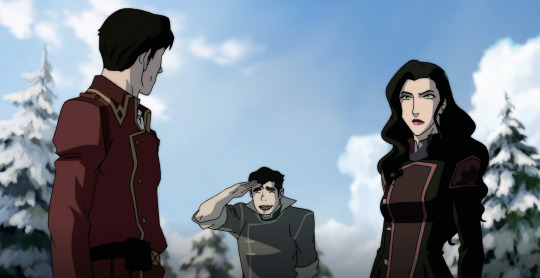
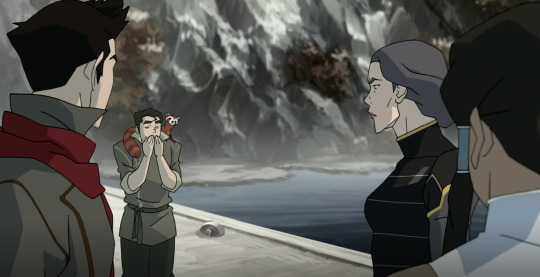
but he also starred in some fantastic collabs.
Bolin x Naga
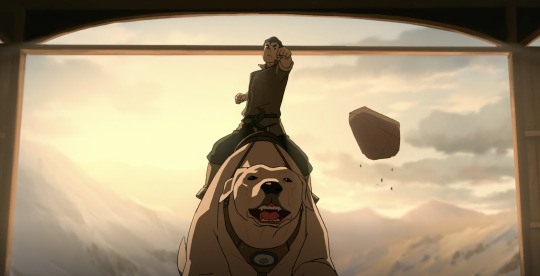
Bolin x General Iroh

Honestly, Bolin x Any Character <--- now that’s my kind of ship.
General Iroh is just as stupidly fearsome and heroic as his grandfather.
This is fact.
His stunt with the planes?
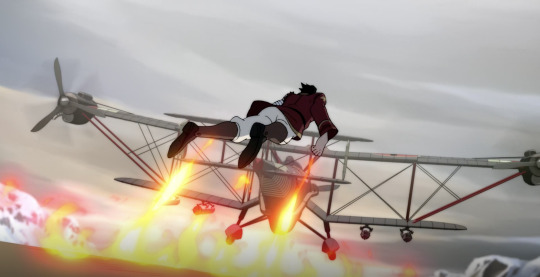


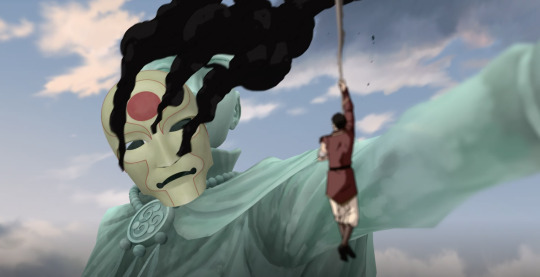
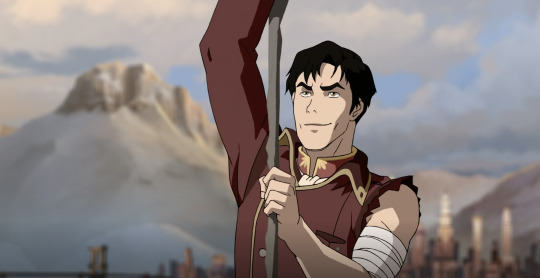
Cray.
I’m looking forward to seeing more of him in the future, preferably in the same scene(s) as Zuko because that’s something I desperately need in my life.
My favorite Mako: protective and powerful.
Let’s not forget, he can break free of Noatak’s bloodbending!!!

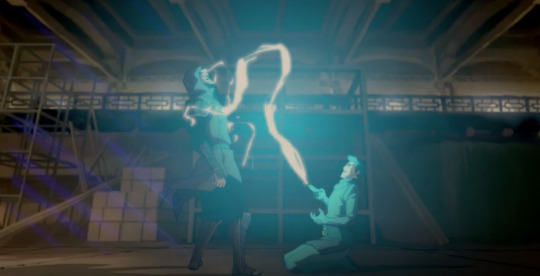


Korra---the freakin’ Avatar---couldn’t even do that! At least, not at first.
Amon admits it himself: “I'm impressed. No one has ever gotten the better of me like that. It is almost a shame to take the bending of someone so talented.”
I hope Mako’s talents become focal points in the next books. Please, oh please don’t revert him back to a frustrating, lovesick puppy who can’t make up his damn mind. It really doesn’t do his character justice.
Speaking of lovesick puppies...
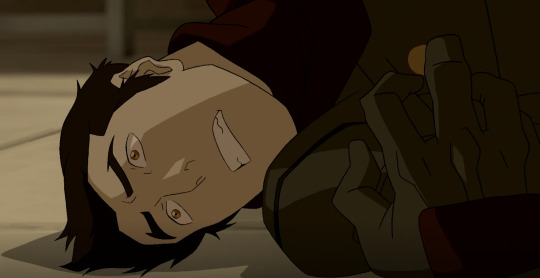
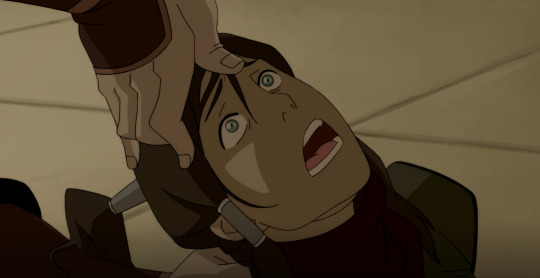
Without a doubt, Mako and Korra had the most compelling scenes of the entire episode (and not because they were fighting Noatak).
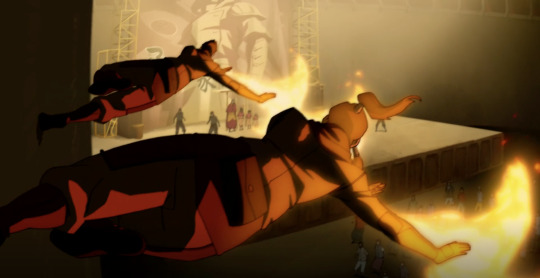
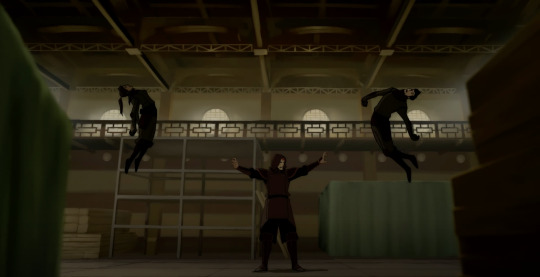

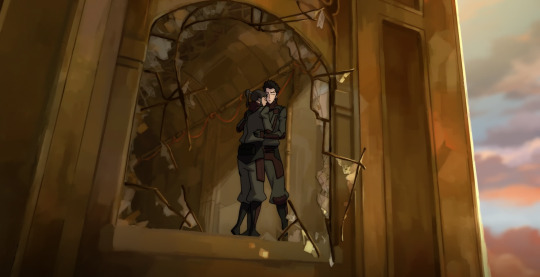
Canon couple or not, these two make a great team. They obviously care about each other, but they’re fiercely protective of one another as well, and that’s what makes their chemistry so palpable.
Although I wasn’t over the moon about dropping the love bombs, even I recognize how heartwarming their moments were.
Take, for example, the penultimate scene of the finale:
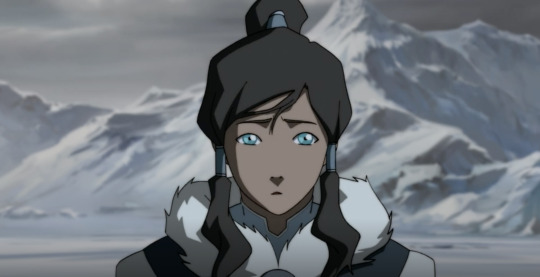
Recap: Mako tells Korra he loves her, Korra dramatically runs away with Naga, and Tenzin tells Mako they have to be patient with her, which is old people code for “give her some space.”
If you ask me, that’s shitty advice.
In real life, I want someone to go after me, even if I say I want to be alone or I tell people to go away.
Yes, I am that person.
So you best believe my heart SOARED when the boy chased after the girl:
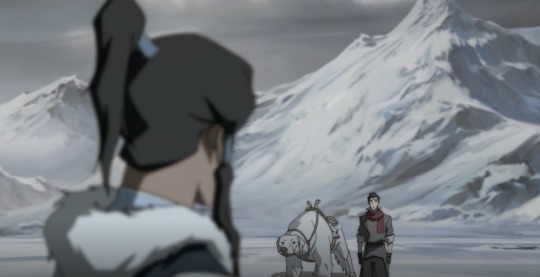
At first, Mako’s shocked.
No surprise there.
He just witnessed Korra in the Avatar State, which means 1) her bending is back and 2) the Avatar State is no joke!! The glowing eyes!! The command of the four elements at your fingertips!! That’s hardcore, bro!!

But then he fondly smiles at her, which I wholeheartedly interpret as “Ah, yes. That’s my girl.”
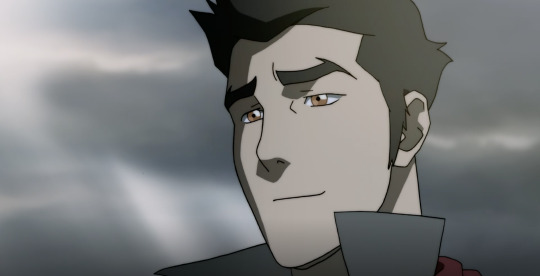
And look at her face!!

These two aren’t endgame, so I’m allowing myself to savor in the swoon.
FYI: If there’s anything you should know about me, it’s that I’m a sucker for cheek caresses.
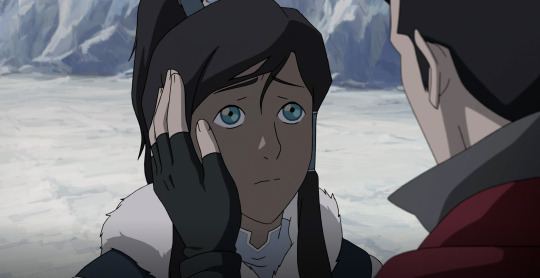
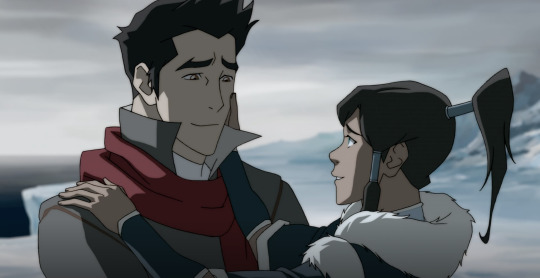
Twirling hugs also make me a lil weak in the knees.
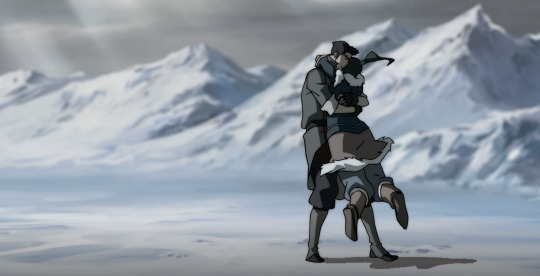
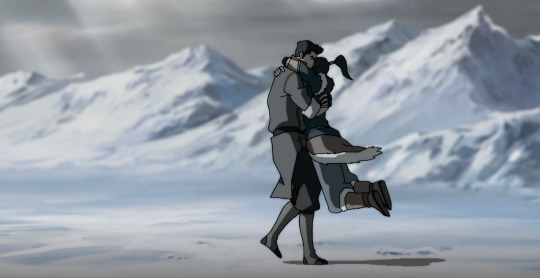
Running to someone and barreling into their arms is just stupid cute.
[Heavy sigh.]
I was really rooting for Asami.
After Chapter 7, I thought we were going to see how Asami was coping with the reveal of her father’s conspiring nature. Instead, her character seemed to revolve more around the love triangle (or whatever shape you want to call the ridiculous Asami x Mako x Korra situation). When Asami does mention her father, it’s only a sparse comment every other episode or so.
Thus, the showdown between father and daughter lacks an emotional weight, and it’s partly because we haven’t explored enough of their relationship to truly feel for these characters.
That isn’t to say their sequence doesn’t have powerful moments.
I just want to take a moment to holla at ma boy @Jeremy Zuckerman, sole music composer.
Your music is always stunning, but the accompanying track in Asami and Hiroshi’s showdown (plus the music in the boat scene and everything in the third act) is what carries the entire segment.
Your melodies tugged at my heartstrings in ways the story couldn’t.
Their final fight, for instance:
Asami is so caught up in the battle---defending herself against her father, no less---that you think she might actually do it, she might actually hurt him.
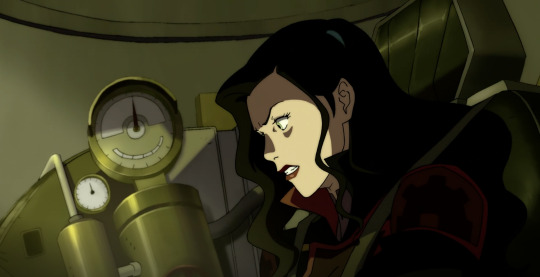
But then he’s looking at her like this,
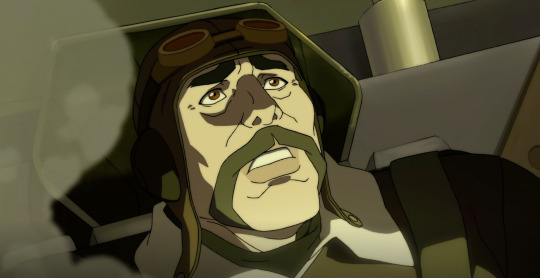
and she starts to hesitate (this is her father after all),
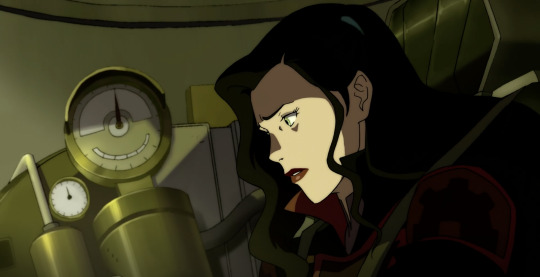
which is the exact moment Hiroshi strikes.
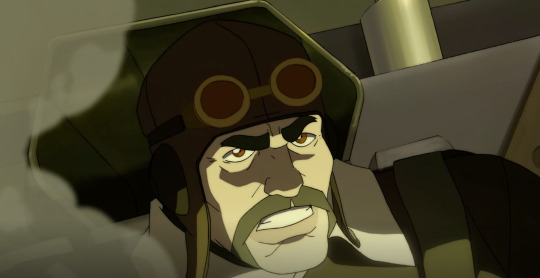
In the end, Asami captures her father, but not without remorse: “You really are a horrible father.”
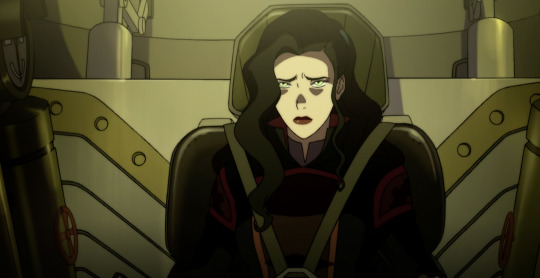
Dear Creators,
Please give your characters the emotional depth they deserve and explore the nuances of their relationships.
Trust me: they can lift the weight of their stories just fine.

I am unbelievably disappointed in Noatak’s arc.
I just---
I mean---
How?
How are you going to build the foundation of a character on a lie?
How are you going to develop that character’s arc for ten episodes, then discredit almost everything with deceit??
How are you going to completely undermine your character like that???
And to add insult to injury, Noatak keeps lying, going so far as to reveal a fake, painted scar:
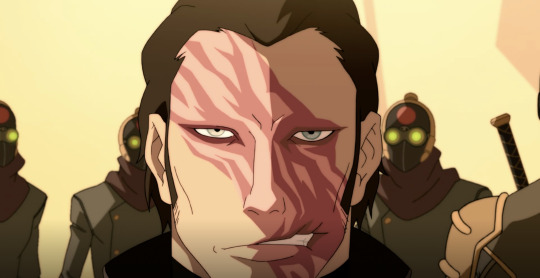
Here’s the thing: Zuko is my world.
Of all the characters from Avatar: The Last Airbender, I found pieces of myself in his story the most. Scars, then, are sore subjects for me; sometimes, I feel like I’m as sensitive about his scar as he was.
Yes, I jumped in my seat upon first seeing Noatak’s “scar,” but make no mistake---I’d rip that lie off his face in a heartbeat.
Undermining your character with lies is bad enough, but this shit felt like mockery, and while I’m certain that wasn’t the creators’ intents, I’m taking it personally anyway.
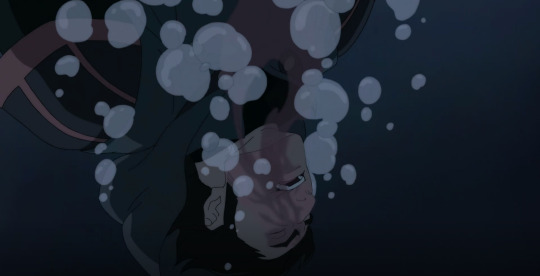

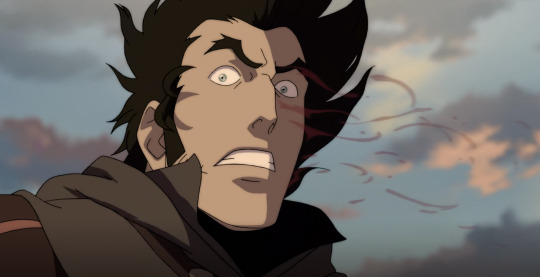
However, attention should be paid to Noatak’s last scene:
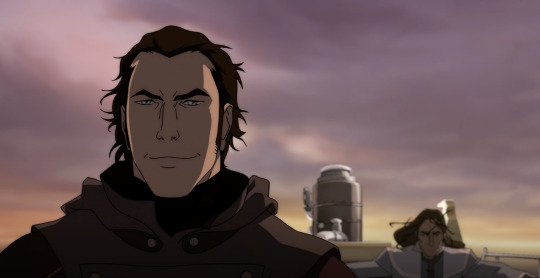
Again, the music is so beautifully somber, but the dialogue here is probably some of the episode’s best.
From Noatak’s “I had almost forgotten the sound of my own name,” to Tarrlok’s "It will be just like the good old days.”
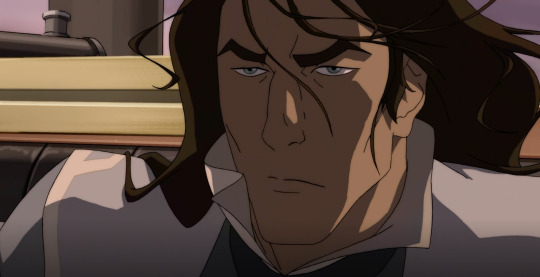
From the tear that rolls down Noatak’s cheek,

to Tarrlok's decision to sacrifice them both.
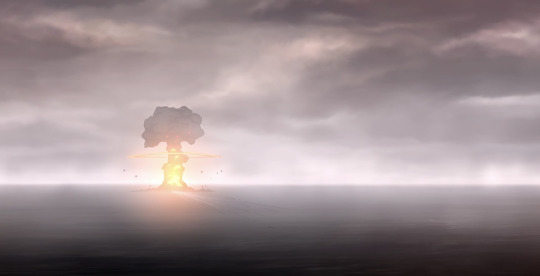
It doesn’t make up for butchering Noatak’s arc, but this was, quite simply, a beautiful ending to a sad story.
Dear Creators,
Please don’t make the same mistake twice.
You compromised the integrity of your character the moment you sacrificed a fleshed out plot for woaw!shock factor.
Villain or not, he deserved better.

Also, I CAN’T BELIEVE YOU.
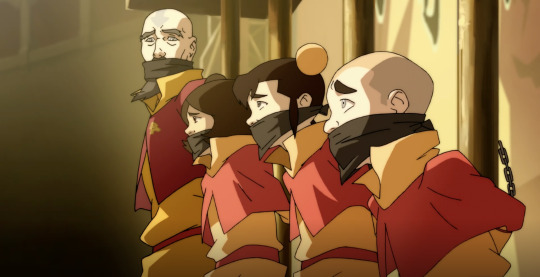
It was at this moment that I wanted to jump into the screen and rescue Tenzin and his beautiful children myself.
LOOK AT THEIR FACES.
I WAS SO MAD.
LIKE:
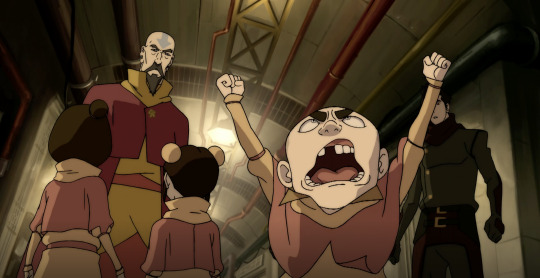
HOW COULD YOU.
It should be said: I loved Korra in this episode.
I mean, she was pretty daft to think that hiding under a table would keep her safe from a bloodbender. A bloodbender (a psychic one at that) can feel your blood, Korra, of course he knows you’re under there.
So just for that:
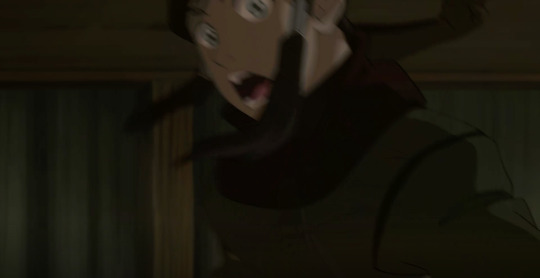
Yeah, don’t you look all silly and fuzzy.
Aside from this idiotic little slip, she was pretty badass, unlocking her airbending and fighting against Noatak’s bloodbending:

What a crappy screenshot of her airbending, haha. Would you believe me if I said this was genuinely the best I could do?
And unlike Asami and her father, I actually felt for Korra. I was devastated when Katara couldn’t repair her severed connection to the other three elements.
Though I wonder if I felt more for Korra because she acted just as I would. That is, she’s clearly distraught over losing her bending, but she wants to spare her friends and family the trouble of making a scene:
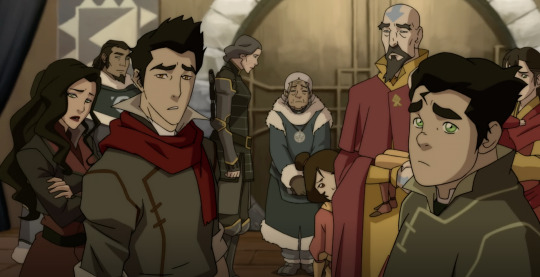
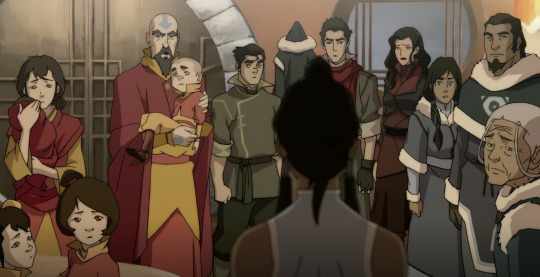
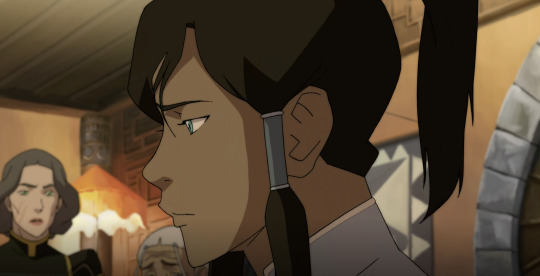
So she waits until she’s alone to let it all go:
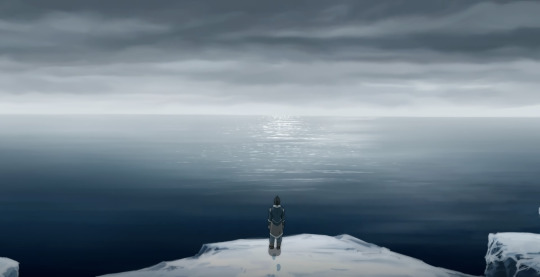
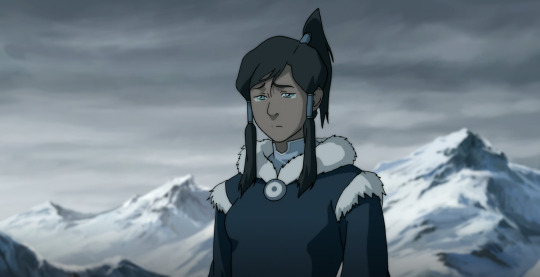

:’-(
As I said, I loved and felt for Korra in the finale, and I don’t have a problem with her...
I have a problem with the writing.
Korra’s airbending was very badass, but I completely forgot about her airbending struggles.
The first four episodes show Korra’s conflict with the element (i.e., it’s literally the plot line of Chapter 2). If anything, these episodes have small moments that remind us of Korra’s airbending training---practicing in the temple’s courtyard or doing exercises with the kids, to name a few examples.
Then, in Chapter 8, Tarrlok insults her with the “half-baked Avatar” comment, snidely remarking on her less than satisfactory airbending. It’s in this same episode that Korra reminds Tenzin---and the audience---that she’s never been able to connect with her spiritual side. (More on this later!)
And... that’s it.
After the eighth episode, she’s kidnapped by Tarrlok, who reveals himself as a bloodbender; she’s rescued but then Amon and Hiroshi attack Republic City, separating Korra and the teens from Tenzin, his family, and Lin; Korra decides to take Amon on her own (but not really because Mako decides to tag along) and the two of them bump into Tarrlok, who reveals that Amon is actually his long-lost, waterbending, psychic bloodbending brother, Noatak.
It’s not necessarily a bad thing. If the creators were prioritizing awe! and shock! and woaw!, then unlocking Korra’s airbending this way definitely did the job. But it felt a little too... convenient? Plus, there was no explanation for why her airbending worked when it did.
I mean, saving Mako obviously had something to do with it, and they didn’t have time to get into the details because, duh, they were trying to restore Korra’s bending.
Still, the audience shouldn’t have to interpret everything.
(Or perhaps I’m just being petty, lol.)
For a book titled after the element, I guess I just expected more.
Ultimately, I wish we saw Korra practicing more airbending; I wish we got an explanation for how and why she airbended when she did; I wish her success in unlocking her final element had not been overshadowed by the loss of her water-, earth-, and firebending.
Which brings me here, to this special moment:
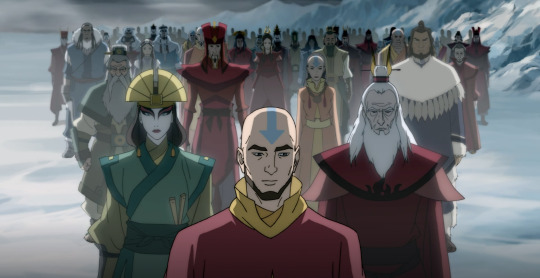
I cried.

100%.
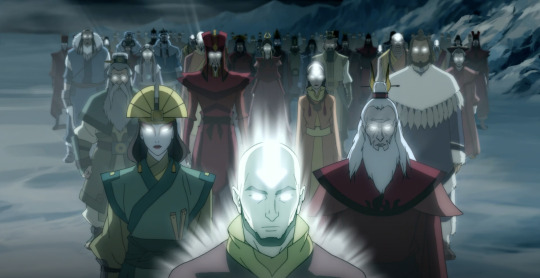
And the gentle, yet all too familiar Avatar theme playing in the background? Yeah, I was a puddle of tears.
However, as nostalgic as this was, I wasn’t too pleased at how quickly Korra’s bending was restored because it felt like the creators were taking shortcuts again.
For the record, I like that Noatak took Korra’s bending away (though I would have liked a more epic battle?), as it debunked the whole “the Avatar is invincible” concept. But, really? A quick touch of Aang’s fingers and her bending is restored, just like that?
Maybe it’s just me, but I would’ve loved to see Korra struggling to get her bending back. Perhaps we could’ve seen her retraining and relearning the other elements, which is something I still feel we were robbed of.
Furthermore, as much as I enjoyed seeing Aang and all the former Avatar reincarnations, I didn’t like that this was also the moment Korra connected with her spiritual side. Similar to her airbending moment, I forgot about her spiritual struggles; the issue is last mentioned in Chapter 8 and, before that, all the way back in Chapter 1. But, honestly, I think the ease and convenience of this moment lends to the problematic pacing of Book I as a whole.
Dear Creators,
While I thank you for restoring Korra and Lin’s bending, please don’t resort to convenient endings. I recognize that you only had twelve episodes, but please, no more shortcuts.
Your story will suffer.
Your characters will suffer, too.
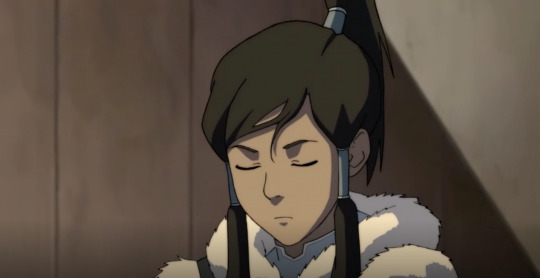
p.s., I’m sorry for being so mean to you. I have a lot of feelings, is all.
Cheers to Book II, though!
Parting Thoughts
Before sitting down to write the finale’s review, I took a two-week break.
In that time, I rewatched (and re-rewatched) the entire first book.
I even had time to indulge in the fifth season of The Great British Baking Show.
Shameless Plug:
I absolutely recommend this charming baking competition.
You learn quite a lot about the science and precision of baking, endure (but also adore) countless baking puns, and witness what true competition looks like. That is, genuine camaraderie, rooting for your fellow bakers to succeed, and sometimes, lending them a hand if they’re pressed for time.
Warning: do not watch late at night. You will reach for a baguette.
And yet, I still feel meh about Book I.
The season has its share of success: the music is as impeccable as ever and the technological and industrial components of the Avatar-Korra universe are developing and expanding nicely.
However, it will always come down to the story, and the writing just wasn’t up to par.
Truthfully, the real triumphs are the characters, who---after only twelve episodes---have built a home for themselves in my heart:
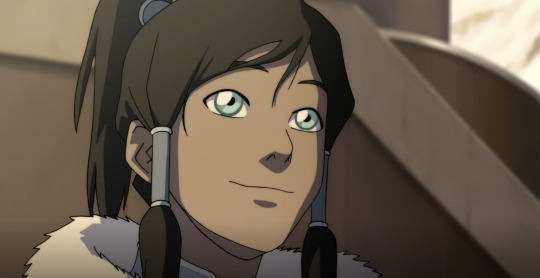

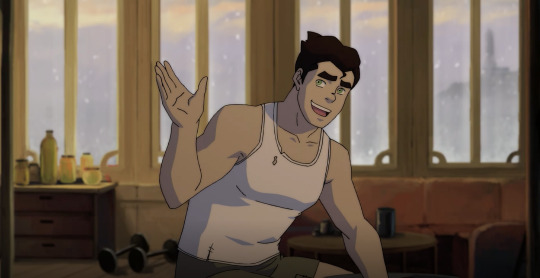
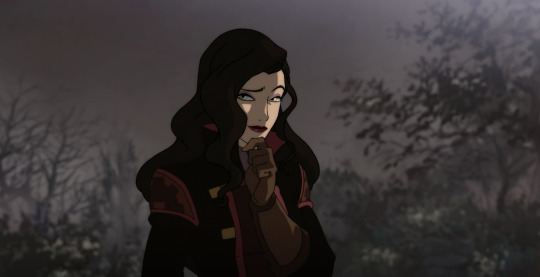
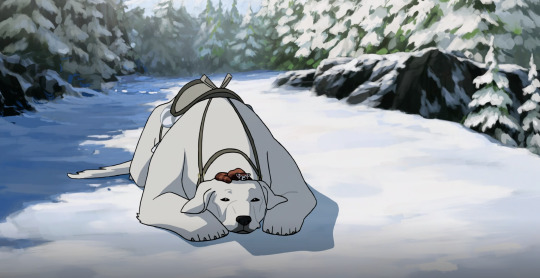
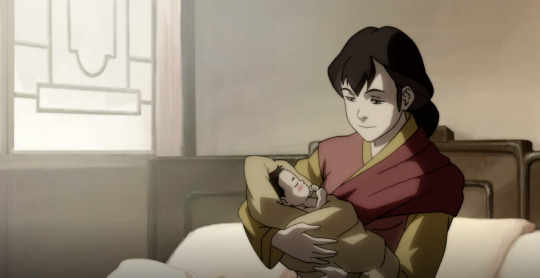


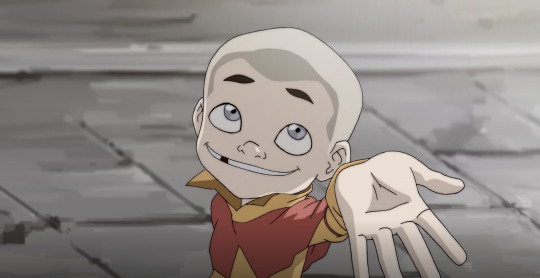
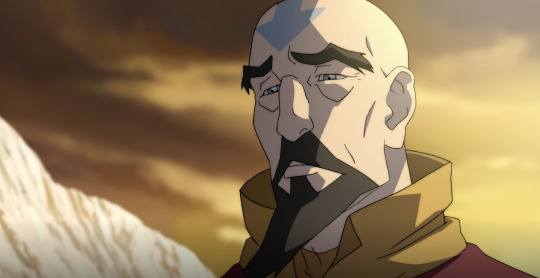
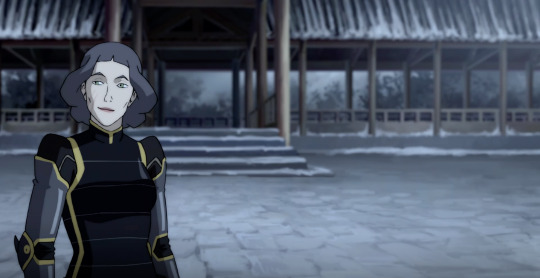
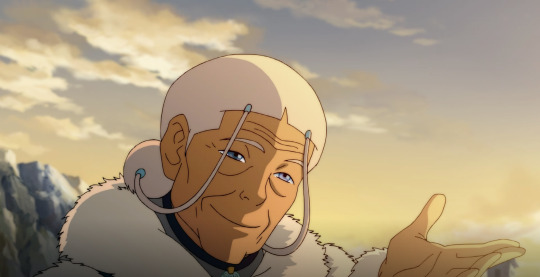
Although, our bright, blue-eyed Avatar still has much to learn.
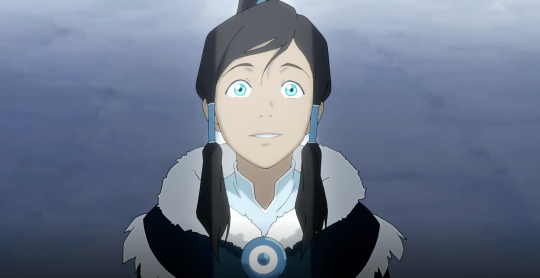
(i.e., how to stop being an impatient little dumdum)

But take heart...
Her story’s only just begun.

From Beginning to End:
“Thanks for looking out for me, Aang.”

credits
1 note
·
View note
Text
American Satan: An Interview with Andy Biersack, Ben Bruce and Ash Avildsen
Interviewer: Sam Rivman Source: www.huffingtonpost.com Sam: What is the film’s plot rooted in? Is this someone’s personal experience?
Ash Avildsen: With the exception of the physical manifestation of Satan, everything in the film is based on real events. Either myself, or these guys, or the producers have had these experiences in the rock music scene. It didn’t take that much crazy imagination, even though when people see it they’ll say “how did they think of that?”. Specifically when it comes to rock music craziness, truth is usually pretty important.
Ben Bruce: It’s a pretty accurate metaphor I think, the devil and selling your soul.
Andy Biersack: Personally, my character in the movie is from the Midwest and goes out to L.A to be a big rock star. In that regard it’s very similar to my own life. I grew up in Cincinnati, Ohio and left to make it in the rock world. The difference is I didn’t make a deal with a deity. When there’s so many divergences in paths that you can take to success, I think without a doubt you lose a part of yourself in those early years. You can sometimes forget where you came from initially, and the characters in this movie are right in that stage where they’ve given everything to become rock stars and they’ve been given the opportunity to get a shortcut. Hard work pays off, but I don’t know what I would have done if I had the chance to become very successful out of nowhere. When you’re hungry and you want nothing more than to have that success, who knows what you would do if someone presented you with the keys to the kingdom?
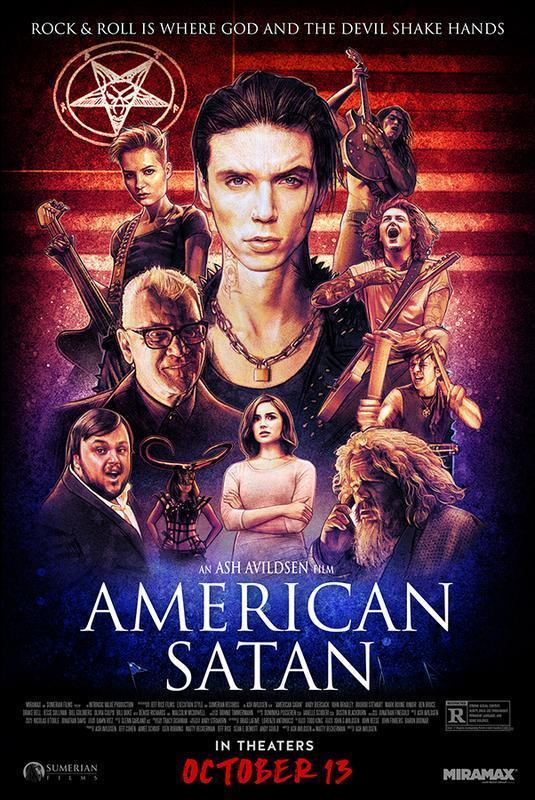
Ben Bruce: You’re very much thrown into the deep end quickly and you either learn to swim or it does consume you. Over the years there have been countless iconic rock and roll films, but the characters were all actors. I think one of the wonderful things about this film, that we’re all musicians. We have lived this life, we have been through it, so when you watch this film its a unique perspective.
Sam: What would you say are some of the musical influences for the film? Tell me about some of the composition.
Ash Avildsen: Once the band explodes, I wanted to have the music sound like what a big band might sound like today. There are a lot of bands on rock radio right now that are imitating the greats.
Ben Bruce: (to Ash) It would have been really easy for you to go down that route and pick some old hits, but you didn’t do that.
Ash Avildsen: I wanted to be like “Okay, what if Tool was a more mainstream heavy metal band with more raspy punk vocals?”. So I strayed away from having the band sound classic rock, I wanted it to sound modern and relevant. We weren’t ambiguous with the time frame. A lot of movies wont tell you the time frame, “It Follows” did a really good job with that. We wanted to make it clear that this was present day.
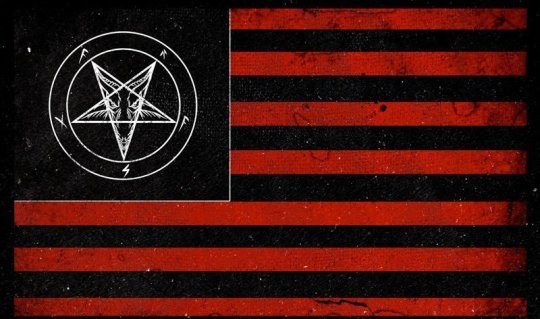
Andy Biersack: The truth is for us, as career musicians emulating these musicians playing these songs, one of the coolest things for me and I think for Ben as well is that these are not our bands. We got to be these other people with this other sound, and that was a great way to get lost in the character. It didn’t feel like this is what we had done everyday for the last decade.
Ben Bruce: I did an interview not too long ago where they asked about that, and the craziest thing about this for me is I’m not necessarily in the place that my character portrays in the movie anymore. It really did take me back, the movie for me was very nostalgic. It made me look at how I was when I was young and think “I can’t believe the place that you’ve come to in your life and the person you’ve become”. Because it did feel very familiar, and its scary.
Sam: What are some of the directorial influences in the movie? What works did you study while making “American Satan”?
Ash Avildsen: This is really a coming of age story, and one film I loved growing up was ���Dazed and Confused”. That doesn’t get too dark, but if it got way more gnarly that would be similar. As far as music film influences go, “The Doors” is really the best one. There’s another film called “Sing Street” that we looked at, I thought “Straight out of Compton” did an excellent job. I really wanted the audience to be along for the ride, feeling like the sixth member of the band.
Sam: What do you want your audience to be thinking after they see this film?
Ben Bruce: There’s the age old thing of people saying “Ah, you’ve got the best job in the world!”. This movie just shows that isn’t factual, that’s not the case. We love our jobs, we have a great time, but there’s so much that goes into it, so many things that can drag you down as a person. I want people to step away from this movie and say “I get it”.
Andy Biersack: One of the things that I’m most struck by and that I hope people will see is that people can change. When you’re young and living fast, whether or not its rock music, you might do things before you’re able to put real thought into who you’re going to be. I think that by the end of this film, Johnny is ready for change and the next chapter of his life. I hope that if nothing else, maybe some young people that see this who are going through something similar see that it’s okay to grow and change.
Ben Bruce: You’re not destined to live a life of your past, and that speaks loudly in this film.
youtube
#andy biersack#andy black#interview#ben bruce#black veil brides#bands#asking alexandria#american satan#video#text#video1#interviews1#as1
170 notes
·
View notes
Text
September ‘20
Paradise Killer

Putting it out there front and centre that I know some of the folks involved in creating this, and clearly I’m devoid of sufficient integrity to be impartial. You know, it’s best to get these things out there, with the internet being what it is.
It’s a whodunnit set in Paradise, with your character having been brought back from exile and tasked with solving who’s responsible for the mass-murder of the island’s core council. There’s a clear set up with one guy already due to take the fall, but it quickly becomes apparent that the island’s populous of weird deities - who perhaps have too much time on their hands - clearly have more of a stake in this than they’d like you to know. You’re left to investigate at your own pace, poking around crime scenes and places of interest, but also soaking up the island and its vibe as a whole. Getting reacquainted with its residents is a massive chunk of this, and if their out-there names, colourful outfits, and eccentric behaviours weren’t enough to draw you in, there’s more serious manners such as allegiances and motives to start peeling back the layers of. Titbits of info gleaned will often give you the opportunity to eke more out of someone else, and although the game does a great job of subtly nudging you to where loose ends might best be chased down, you’re given the freedom and ultimate responsibility on when to start wrapping things up at trial.
Given the potential for disorder in its narrative structure, the game’s job in cataloging all of your gathered information is crucially neat in its execution. The free rein that allows you to be as orderly and meticulous as you choose is welcome, as is the gentle push towards the truth of things. But there’s also just enough space to sink into convenient falsehoods - even to present them at trial and make them stick, if you can pass on that conviction - and it’s this freedom that really sets it apart from its contemporaries. Helping this is a fully realised island you can move about in and investigate, rather than doled out chunks of exposition by chains of talking head sequences. More salacious secrets are typically locked behind puzzles or specific items, but there’s also a particularly inviting nature to the architecture that suggests playful acrobatics - dashing, double-jumping and the like - be used to explore out-of-reach areas.
The look is tinged in pinks and blues, giving a suitably welcoming glow to Paradise. It’s warmth is helped massively by the soundtrack that runs throughout it, bringing pleasant, jazzy saxophones and subtle, warm electronics into its city-pop inspired stable. There’s a great voice running through its veins too - one that operates in its unspoken thoughts, the descriptions of its collectables, even the interface and the sub-headers as you enter new areas - just about damn everywhere. It’s smart, it’s cynical, and it’s snappy, and is a regular factor in keeping a smile on your face even in the moments that get closest to being downtime. Bias be damned! I can say, hand-on-heart, that it’s a game that not just nestles in comfortably among its peers, but stands tall among them.
Moon
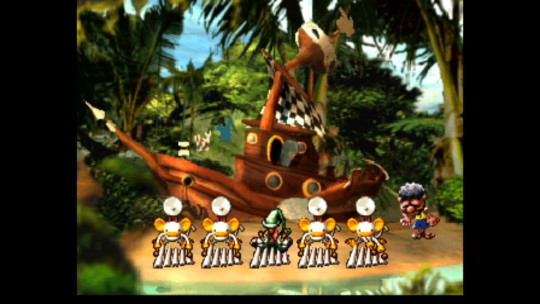
Cult status can be a double edged sword. For anything cult - movies, albums, games, you name it - there’s that risk that if put under a modern lens, they can be painfully of their time. Cherished by those that were there, perhaps, but impenetrable - or even worse, alienating - for those without that context. Previously a Japan-only PS1 title, Moon has held such status for 20+ long years, but on its return, lets you know very quickly that a lot of what it had to say was timeless.
Its sending-up of RPG tropes is pretty spot on - the game-within-a-game that your character boots up got a big belly laugh out of me almost immediately, and then leads into a montage of a hero’s journey through a world that you’re then later transported into to pick up the pieces. See, the ‘hero’ in the game is kind of a jerk - barging into people’s homes, taking things out of their cupboards, killing all of the wildlife, and so on - and while this likely sounds very familiar, Moon prompts you to remove that filter of normal game behaviour, and instead asks that you try and be a bit more conscionable and pleasant. Acts of kindness to others are repaid in love, a tangible currency that grows your love level, allowing you to spend more time in its world before you need to rest and begin your day’s busy-bodying anew. Observing the routines of the world’s inhabitants is key to making good on its many grievances, and although these are straightforward enough at the start, some of the later challenges relied on some more tenuous thinking - to which, I’ll put my hands up and say that I turned to a walkthrough. These more patience-testing moments might have been a good way to pad things out in ‘97, however it’s a bit steeper an ask today, when I daresay most people will be visiting this as more of a curiosity. Accepting a helping hand doesn’t stand in the way of these scenarios delivering on the charm, surprise, or humour they originally aimed for, though. Labelling it a parody or a spoof might work as a descriptive shortcut, but it’s never mean spirited, and clearly loves the subjects it pokes fun at - there’s a wonderfully self-effacing humility throughout it.
Given Final Fantasy 7 - often cited as a common entry point for many modern western fans of JRPGs - didn’t even arrive in Europe until after this originally released, it’s not hard to understand why it wasn’t considered for localisation at the time. The audience certainly didn’t exist at scale, and simply wouldn’t have had the gaming experience or vocabulary to appreciate it. Not only can we now better appreciate it as the tongue-in-cheek love letter it is, but the message of compassion and thoughtfulness is something that’s more essential today than arguably ever before.
Spelunky 2
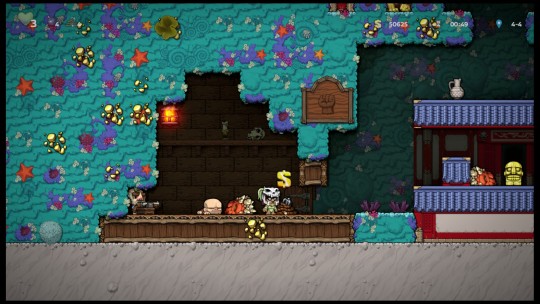
This was always on my radar as a likely ‘game of the generation’ contender. I’ve been playing the original game on and off now for around 8 years - it’s followed me as a regular part of my gaming diet across 4 different platforms, and crucially, all the way up until the night before this finally landed on my PS4. Without getting too philosophical about it, it’s a very important game to me. Despite all of the time playing it, thinking about it, talking about it, or even reading the gosh darned book about it, I never once thought to assume I had the answer for what would make a fitting sequel. Thankfully, the team behind it had more ideas, and the faith in their convictions.
All of the crucial components of the original are here in abundance, and added to with a restrained modesty. Its randomly generated levels are more complex, and offer more distinct ways of hiding secrets, all while a subtle but slick graphical overhaul does great work in making them look more organic than ever before. More complex fluid physics allows for more transformative ways of opening up levels, and mounts might add some quirky new dynamics to things, but crucially, things under the hood beside this remain largely the same.
Perhaps more importantly, Spelunky 2 understands the fervent player base centred around the original game, and uses their knowledge and familiarity to challenge them anew with clinical precision. Things are just similar enough: the title screen, the tutorial, many of the enemies, and the stages that you find them in - they’re tweaked, yes, but still familiar. On top though, there’s enough that’s new, or changed in a minute yet specific way that makes it very clear that things are going to be uniquely dangerous all over again, and that your muscle memory is more of a liability than a crutch. The curve of learning the game - understanding and tempering its dangers, and the slow, cautious, pulling back the curtain of its newer secrets - is still pitched in the same utterly compelling way as before, though. Rather than being harder outright, or just more lumped on top, it finds a way to make new players and familiar faces alike to learn to play Spelunky all over again, and it’s a total joy to have that opportunity. It’s everything I didn't realise I wanted in a sequel, and it’s breathed a new lease of life into a game that I wasn’t even bored with in the first place.
Tony Hawk’s Pro Skater 1 & 2 Remastered

The original THPS was proper lightning in a bottle stuff; while its countless sequels eventually drained every good idea bone dry, and it left countless half-baked spin-offs in its wake, it’s hard to be mad, or surprised, when the original formula was so potent. Underpinned by a brilliant combo system that called back to arcade-style score chasing, in tandem it also nailed the kind of goal-based mission objectives that became so common after it. This is before you even get on to the way that skateboarding’s irreverence, fashion, and music were curated and presented in such a way that they left a mark on an entire generation. Sports titles are often glossed over from a critical perspective, but there is no escaping the quality and impact of this series.
This remaster tries to capture it at its zenith - and although they’re arguably off by a game or two, depending on who you talk to - it’s generally welcome that some of the ideas from later games are pared back. What it does with these first two games is for my money, the gold standard of what a remaster should do - it makes them look and feel like you imagined they did at the time; smooth, detailed, and responsive. Please, don’t make me go back and look at what the originals actually did look like, because I don’t think my poor brain could take it. The kitchen sink has been thrown at everything surrounding the game, with more relevant and diverse skaters brought into the fold, menus upon menus hiding a wealth of additional challenges, and a soundtrack that celebrates the older, punkier roots of the game, but also shines a light on some musical features that are perhaps more relevant to today’s youth. It’s all handled with a surprising elegance.
It’s a great new way to introduce the series to people, and also a nice outlet for old hands, with my only real criticism being that I had blasted through both of the original tours within a day of dropping the disc in my system. Yes, I could chase high scores endlessly, and yes, there’s a park builder and an abundance of multiplayer modes - but if you’ve finished these games before and just want to revisit them with a new lick of paint, don’t be surprised when it dries out fast.
0 notes
Text
Why Ducktales is important
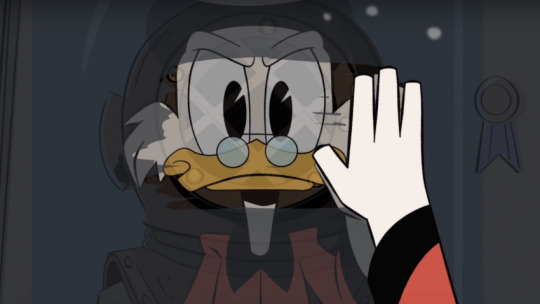
At least…If you like Disney Television Animation.
Which I do. Oh so much.
If you’re a fan of Gravity Falls, or Star vs. The Forces of Evil, or Wander Over Yonder, or Kim Possible, or Gargoyles, or any Disney Television show, then gather ‘round because I’m about to teach you some history.
“Never forget, that it all started with a Mouse,”~~Walt Disney.
Great things come from humble origins. Never forget that Disney TV…All started with a Duck.
It was the 1980s. Disney Television Animation was a new department at Walt Disney Studios. And Disney was suffering. These days it’s easy to think of Disney as a mega-giant, but back then, Disney was suffering. Movies were being produced on shoestring budgets, and animators (such as Don Bluth) were jumping ship to find work at studios that were paying better and producing better content. The Little Mermaid hadn’t yet hit theaters, sparking the Disney Renaissance. The fledgeling animation department had produced two shows prior, “The Wuzzles” and “The Adventures of Gummy Bears”.
Disney was in dire straights from Walt’s passing in 1966 left the studio suffering up until the 80s, when they started to take a few risks. Risks that paid off. The studio gambled on the idea that investing more money into quality animation would pay off in the long run if the show went into syndication. It was something that worked well with live action, but had yet to be done with animation to that degree. Cheap animation with tons of shortcuts could be syndicated, but something high-quality had never been done before.
Ducktales was the first show that attempted this, and it paid off handsomely. Not only was the show a hit with audiences (and a merchandising cash-cow) but it changed the game. It set the stage for the Disney Afternoon a few years down the road, and paved the path for every show I mentioned at the beginning. Without Ducktales, there would be no Gargoyles, no Star vs. The Forces of Evil, no Gravity Falls.
Heck, I take it even one step beyond that…Without the inspiration of proof-of-concept, I’d wager that even OTHER studios cartoon creations wouldn’t exist. No Animaniacs, No Adventure Time, no Steven Universe (and don’t think I missed the shout-out to Ducktales in “Onion Trade”)
Ducktales was important because it raised the craft of animation to another level, combining storytelling with good, non-repetitive animation to produce quality TV. For a time, Ducktales was Disney’s Flagship TV series, waving the banner and representing the company in the realm of television animation.
And even today, the classic Ducktales series holds up rather nicely. Sure, some things are a little dated, but at the end of the day, I enjoy watching Ducktales without reservations. That’s why I own the DVD sets.
And it’s why I’m so happy about this reboot.
This isn’t just a revamp of an old show. This is Disney returning to its roots, reclaiming a bit of it’s history and polishing it off for the next generation. I’m a little misty eyed. I had some initial misgivings when this was announced, but the cast announcement melted those fears away, and now, seeing the trailer that dropped less than 24 hours ago…I don’t think I’ve ever been this excited for a TV series ever.
Breaking down this trailer, we finally hear David Tennant as Scrooge McDuck. I’ve actually been aware of Tennant’s presence in the voiceover scene for a few years now (Most notably, he plays bit parts in the How To Train Your Dragon franchise from Dreamworks) But hearing him as Scrooge…I really feel it works. He’s got a certain quality the echos the late, great Alan Young, and I feel like he couldn’t have been better cast without some of that good old fashioned Disney Necromancy (And as we know, they used up their allotment of Necromancy on Peter Cushing for Rogue One)
I love that the Nephews are getting unique characterization and personality. I loved Russi Taylor’s performance way back when, but one Nephew was really interchangeable with another. Dani Pudi, Ben Schwartz, and Chris Moynihan really bring an awesome chemistry to their roles, just from the trailer.
And then there’s Webbigail. Oh my God, I love how they’ve rebooted Webby. She was always the annoying load back in the classic series. Making her a Donald Duck fangirl is freaking GENIUS (and Kate Micucci is perfect for this role too) Bonus points given for Webby’s infamous “Quacky-Patch Doll” being used for dart practice in the background of her room. Webby has gone from outright “The Load” territory, to one of the most fun-seeming characters present in the reboot.
And all of this from one minute and a half trailer. I can’t wait for this series, even though I know I must. I know it’s gonna be something special, I can feel it. Maybe even Disney’s Flagship show, once again. Stay tuned to my Tumblr, for much, much more.
One thing I know for certain that I’m going to do when the pilot for this airs…A side by side comparison of the Classic Pilot and the new one.
Peace out,
Disney Wizard
#Disney Wizard Rambles about Cartoons#Ducktales#Ducktales Reboot#Gargoyles#Gravity Falls#star vs the forces of evil#Kim Possible#Disney History#disney television animation
7K notes
·
View notes
Photo
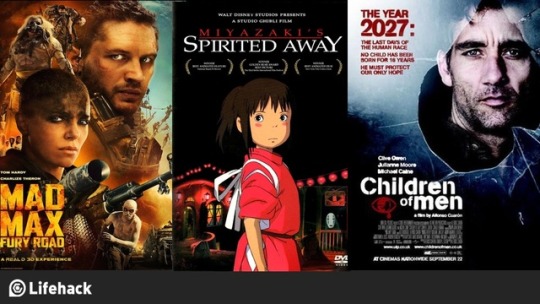
New Post has been published on http://www.lifehacker.guru/bbc-has-concluded-a-list-of-best-25-films-in-the-21st-century-that-you-should-not-miss/
BBC Has Concluded A List Of Best 25 Films In The 21st Century That You Should Not Miss
If I ask you to name some of the best movies in the 21st century, what will you say?
The Lord of The Rings? A Beautiful Mind? Little Miss Sunshine? Finding Nemo? Her? Inception? The Martian? Inside Out? Moonlight? Or La La Land?
There’re many amazing films released over the past 17 years. Some are very popular among the public, some got nominated or even received widely-recognized awards. They’re all amazing in their unique way but some of them really stood out from the crowd.
BBC Culture recently reached out to 170 famous film critics around the world and asked them each to pick the best 10 films released from the beginning of 2000 to present days. And based on the critics’ votes, BBC came up with the list of the 21st Century’s 100 Greatest Films.[1]
Here’s the famous film critics’ shortlisted best 25 films with the review for BBC, and you can save a bit of time and know which one to go first. Here we go:
25. Memento (Christopher Nolan, 2000)
youtube
Christopher Nolan’s Memento, an airtight puzzle of a movie about a man who can’t form new memories searching for his wife’s killer, set a standard for narrative sophistication that few mainstream films have tried to duplicate…The film forces us to consider the unreliability of human memory and our tendency toward self-deception, even as it thrills us with a captivating crime-noir story…Unforgettable. – Eric D Snider, Freelance, US
24. The Master (Paul Thomas Anderson, 2012)
youtube
Paul Thomas Anderson’s ambitious, powerful and ultimately elegiac masterpiece centres on the question of whether man is, in fact, an animal. Tormented alcoholic Freddie Quell (Joaquin Phoenix) returns from World War Two and struggles, unsuccessfully, to conform to post-war America’s social evolution…but the real point of the film is an exploration of thought and consciousness, and whether submission to belief systems can genuinely tame atavism. – Ali Arikan, Dipnot TV, Turkey
23. Caché (Michael Haneke, 2005)
youtube
All of Michael Haneke’s films are bound to haunt you. With Caché he cuts to the chase and makes the idea of haunting the theme of the story itself. Daniel Auteuil and Juliette Binoche star as a bourgeois Parisian couple that start to receive disturbing video tapes showing their home…The act of not looking away is the moral imperative at the heart of Caché, which makes it a supreme political and cinematic movie at the same time. – Hannah Pilarczyk, Der Spiegel, Germany
22. Lost in Translation (Sofia Coppola, 2003)
youtube
The 21st Century’s reigning empress of cinematic ennui, Coppola has always used celebrity as a shortcut to the loneliness that exists between private lives and public images… Lost in Translation as her most perfect film, the one that best articulates how it can be to find yourself in a world that seldom lets you forget where you are. – David Ehrlich, Indiewire, US
21. The Grand Budapest Hotel (Wes Anderson, 2014)
youtube
The Grand Budapest Hotel is the 21st Century’s farewell salute to the century before. It vaults backwards in time from today to 1985 to 1968 to 1932, where Ralph Fiennes’ concierge Monsieur Gustave welcomes us to proper civilisation with a nod. We know Gustave’s immaculate world is ticking towards destruction, first by war, then by decades of neglect. Inevitably, the lazy and impersonal present will win, mass-producing not just our hotels, but our cinemas and the blockbusters on their screens… This oddball tragicomedy enlists us in the fight for beauty. Sir, yes, sir. – Amy Nicholson, MTV, US
20. Synecdoche, New York (Charlie Kaufman, 2008)
youtube
Synecdoche, New York was initially conceived when Charlie Kaufman was approached about doing a horror film. Instead of masked killers and extraterrestrial monsters, though, Kaufman set out to make a movie about the stuff that really keeps us up at night. Synecdoche, New York is every deep-seated fear you’ve ever had, writ large: you’ve disappointed your spouse and failed your children, you’ve let your loved ones die lonely, excruciating deaths… Kaufman’s masterpiece is a reminder that even at our lowest and darkest, we are not alone. – Angie Han, Slashfilm, US
19. Mad Max: Fury Road (George Miller, 2015)
youtube
A cohesive vision with a structured journey built around themes of survival and endurance, the fourth entry in the dystopian franchise showcased what is otherwise the narrative and thematic drought within the Hollywood blockbuster machine… Without resorting to cheap cynicism and faux-grittiness, Miller zeroes in on the sensuality of the environments, the carefully crafted machines and scorched landscapes. – Justine A Smith, Freelance, Canada
18. The White Ribbon (Michael Haneke, 2009)
youtube
“By setting the story in a north German village in the months prior to World War One, Haneke not only challenged the myth of childhood innocence but also delivered a fictional prequel to the upcoming events in Germany… it speaks to this century’s audiences: an unsettling view of the danger of righteousness, an ominous threat that always seems to recur. – Fernanda Solórzano, Letras Libres Magazine, Mexico
17. Pan’s Labyrinth (Guillermo Del Toro, 2006)
youtube
It’s Del Toro going back to his roots, to his alchemy of pop and auteur cinema, to give us a look into the horrors of war – in this case the Spanish Civil War… Pan’s Labyrinth gives us tragedy through the filter of fantasy, going deep into a well of suffering and magic. Its power lies in its purity: nothing we can imagine is as terrible as what we can do to each other. – Ana Maria Bahiana, Freelance, Brazil
16. Holy Motors (Leos Carax, 2012)
youtube
Holy Motors is not a movie. It is an act of grief designed as an expression of love, and while enfant terrible Leos Carax has been an essential director for any film fan since his debut… Surreal, silly, sexy and sad, Holy Motors is a guided tour through everything about cinema that matters to Carax. He was drowning as a man in his own life – Holy Motors was his first feature in 13 years after struggling to get financing – and he turned his art into a life raft. Movies matter. Here’s why. – Drew McWeeny, Hitfix, US
15. 4 Months, 3 Weeks and 2 Days (Cristian Mungiu, 2007)
youtube
One scene, one cut, zero music… Imbuing a backstreet abortion with the brutal tension of a crime thriller – and abortion was a crime in 1980s Romania… Yet despite much harrowing imagery, depicted in unblinking detail within a fraught 24-hour timeframe, the film’s underlying humanism is glimpsed through the unbeatable spirit of protagonist Otila, a college student who takes unthinkable risks and goes through grueling lengths to help her friend Gabita fix her unwanted pregnancy. – Maggie Lee, Variety, Hong Kong
14. The Act of Killing (Joshua Oppenheimer, 2012)
youtube
Few films have dared to capture the full spectrum of human evil so candidly, so perceptively, as Oppenheimer does in his unclassifiable non-fiction epic in which the Texas-born Danish film-maker convinces members of the death squads to reenact their murders in the style of their favourite Hollywood films… it’s about national amnesia, about the power of self-deceit and the questionable morality of truth-seeking… it’s one of the most celebrated documentary in 21st Century. – Joseph Fahim, Freelance, Egypt
13. Children of Men (Alfonso Cuarón, 2006)
youtube
Here’s a bold statement about a bold movie: Children of Men, like no other film this century, and perhaps no other movie ever, solves the meaning of life… it’s rich and vital in its emotional and philosophical depth: its sadness, its anger, its reverence and worry for humanity… Children of Men has endured to become a cult favourite that should be required viewing for anyone grappling with feelings of dread about modern civilisation. – Richard Lawson, Vanity Fair, US
12. Zodiac (David Fincher, 2007)
youtube
Zodiac, his meticulous, gorgeous and haunting true crime movie, is a deep dive into obsession, following a newspaper cartoonist who becomes consumed by the 1970s Zodiac murders… Gloriously detail-driven, Zodiac drags viewers into a compulsive world where the smallest hint can be the biggest clue, and it presents the obsessive’s worst nightmare: that, in the end, answers are utterly unattainable. – Devin Faraci, BirthMoviesDeath, US
11. Inside Llewyn Davis (Joel and Ethan Coen, 2013)
youtube
Set in the Greenwich Village folk scene of the 1960s, the Coen brothers’ Inside Llewyn Davis is an achingly melodic tribute to an unloved underdog. Davis (Oscar Isaac) is striking out on his own after his musical partner goes solo. Along his dour journey, he’ll find others vying for similar success and others just trying to survive… Inside Llewyn Davis is a solemn song for anybody trying to become somebody. – Monica Castillo, The New York Times’ Watching, US
10. No Country for Old Men (Joel and Ethan Coen, 2007)
youtube
Bardem’s film characterisation is so powerful, so splendidly overwhelming in his random application of violence, that he manages to extinguish whatever preceded it in the mind of the audience. Set in West Texas in 1980, the film’s sense of time and place are unparalleled… There’s a hypnotic quality to the movie’s pace, watching characters you can’t help but like… make a series of catastrophic decisions that bring each into Chigurh’s universe, a world soaked in blood with a predetermined outcome. – Ben Mankiewicz, Turner Classic Movies, US
9. A Separation (Asghar Farhadi, 2011)
youtube
If there is a film that makes you take a deep look at yourself in the mirror again and again, this is it. Asghar Farhadi’s searing relationship drama does not make a judgement about its characters. Rather, it pitches the situations so realistically that the viewer ends up sympathising with both protagonists even though they are pitted against each other… all made to look as if one is watching one’s neighbours, or maybe someone in one’s own home – create an unparalleled cinematic morality play. – Utpal Borpujari, Freelance, India
8. Yi Yi: A One and a Two (Edward Yang, 2000)
youtube
Audiences in 2000 were astonished by how fluently Edward Yang’s Yi Yi portrays contemporary life through the intermingling stories of members of a Taipei family separated by the dilemmas specific to their stations in life. That’s quite ironic, because in today’s world of personal alienation through the allure of social media, the film now feels like a period piece, yet somehow, it resonates with an even greater urgency… Its quiet reflections on life, love, family and death are all gracefully affecting, no matter the gap in generation and culture. – Oggs Cruz, Rappler, Philippines
7. The Tree of Life (Terrence Malick, 2011)
youtube
Like a great poem, The Tree of Life opens itself to a thousand interpretations, as director Terrence Malick takes a spiritual and lyrical journey through time, from a dusty 1950s childhood in Texas back to the beginnings of the cosmos itself… The joys and aching losses of parenting become transcendent, even Biblical, in Malick’s hands. – Kate Muir, The Times, UK
6. Eternal Sunshine of the Spotless Mind (Michel Gondry, 2004)
youtube
The story of a breakup gone wrong… But this wasn’t your average whimsical tale of romantic yearning… the movie belongs just as much to Kate Winslet, whose character’s decision to erase her own memories of the ex-couple’s time together sets the drama in motion. Eerie and surreal, charming and tragic, the movie wrestles with the fundamental instability of all human relationships, achieving a wise and powerful vision that is — ironically for a tale about fading memories — unforgettable. – Eric Kohn, Indiewire, US
5. Boyhood (Richard Linklater, 2014)
youtube
For more than a decade, Richard Linklater spent a few weeks each year chronicling the life of Mason (Ellar Coltrane)… and watching the cast, which also includes Ethan Hawke and a remarkable Patricia Arquette, age before our eyes, adds an extra layer of poignancy to every single scene. In an era when every aspect of society was accelerating, Linklater slowed down to tell the one of the definitive stories of our time. – Matt Singer, ScreenCrush, US
4. Spirited Away (Hayao Miyazaki, 2001)
youtube
Miyazaki’s story of a young girl trapped in the spirit world, trying to rescue her parents, feels like a throwback to an earlier age of hand-drawn animation… it has an ambitious sweep to its elaborate visuals of Japanese spirit-monsters and a sense of soaring adventure. It’s a traditional fairy tale turned into an exciting narrative of transformation and discovery. – Tasha Robinson, The Verge, US
3. There Will Be Blood (Paul Thomas Anderson, 2007)
youtube
From its near-wordless opening scene, Paul Thomas Anderson’s There Will Be Blood feels like something forged, not filmed. Daniel Day-Lewis, as turn-of-the-century prospector Daniel Plainview, grunts, spits and scrapes his way into a hole under baked Western earth; he strikes silver, drags his half-broken body to certify his claim…The rest of the movie – a sprawling, half-mad testament to greed, industry, moral hypocrisy and ballyhoo at their most elementally American – could be watched with no sound at all and still be perfectly understood. – Ann Hornaday, The Washington Post, US
2. In the Mood for Love (Wong Kar-wai, 2000)
youtube
Wong Kar-wai is one of world cinema’s most notorious perfectionists, but he earned every moment of editing-room indecision with In the Mood for Love… We never see the faces of the spouses whose affair pulls two lonely neighbours into their delirious romantic spiral… all the better to heighten the erotic charge of every swaying hip and every voluptuous swirl of the camera. And we never hear the lost, whispered words at the climax… never before has a film spoken so fluently in the universal language of loss and desire. – Justin Chang, Los Angeles Times, US
1. Mulholland Drive (David Lynch, 2001)
youtube
WH Auden called Los Angeles “the great wrong place”. James Ellroy called it “the great right place”. The idea that two, or more, seemingly conflicting ideas can simultaneously be true is so often forgotten in the zero-sum culture of today, but it’s at the heart of David Lynch’s empathetic masterpiece… Mulholland Drive is a reverie of sex, suicide and “silencio”…. Lynch’s film is so gorgeous and so painful, so mysterious and, in many ways, so recognisable – drive on the actual road, Mulholland, at night, and then walk from Western to Vermont, and you’ll see – that, whatever theory you ascribe to it, the picture does indeed reflect a reality that moves beyond southern California and parks itself in our brains, tapping into our dreams, deepest fears, inscrutable natures, erotic desires, and pool boys. – Kim Morgan, Sunset Gun, US
Are some of your favorite films on the list too? And have you got some new films to watch up next?
This is just the top 25 from the list of the greatest films, check out the complete list on BBC Culture here .
Reference
[1] ^ BBC Culture: The 21st Century’s 100 Greatest Films
©
3 notes
·
View notes
Text
How to Name a Startup: The Crash Course
An important first step is creating a job description for your name. What are its most important duties? The most common decision is that a name should explain to the world what business you are in or what your product does. Intuition dictates that this will save you the time and money of explaining it, which actually turns out not to be true. Why not?
The notion of describing your business in the name assumes that the name will exist at some point without contextual support, which, when you think about it, is impossible. The name will appear on a website, a store front, in a news article or press release, on a business card, on the product itself, in advertisements, or, at its most naked, in a conversation.
There is simply no imaginable circumstance in which a name will have to explain itself. This is fortunate, because having a descriptive name is actually a counterproductive marketing move which requires an enormous amount of effort to overcome. A descriptive naming strategy overlooks the fact that the whole point of marketing is to separate yourself from the pack. It actually works against you, causing you to fade into the background, indistinguishable from the bulk of your competitors.
The following is a list of companies in the naming and branding arena. While each of their names describes what they do, you can clearly see the heavy marketing price they pay for such a shortcut:
Brand-DNA (.com) Brand-DNA (.net) DNA Brand Mechanics Brand 2.0 Brand Doctors Brand Equity Brand Evolve Brand Fidelity Brand Institute Brand Mechanics BrandForward Brandico Brandjuice Consulting BrandLadder BrandLink BrandLogic BrandMaverick BrandPeople Brandscope Brandslinger BrandSolutions Brandtrust Name Development Name Sharks Namebase Nameit Namexpress Namelab Namington Naming Systems Namerazor NameSale Namestormers Nametag Nametrade NameQuest Namix Naming Workshop Nomen Namepharm Nomenon Medibrand Absolute Brand Interbrand Building Brands Real Branding Core Brand Futurebrand The Branding Iron Spherical Branding I.D.ENTITY Identity 3.0 Idiom Brighter Naming Corporate Icon Metaphor Megalonamia Wise Name Creating New Names The Name Works ABC Namebank The Naming Company Ivarson Brand Vision Strategic Name Development The Brand Consultancy Lexicon Branding Independent Branding TradingBrands The Better Branding Company Not Just Any Branding
There are three pieces of advice that will serve you well in avoiding a similar dilemma:
Names don’t exist in a vacuum: There are competitors–the idea is to distinguish yourself. Business is a competitive sport.
Names don’t exist in a vacuum: The notion of describing your business in the name assumes that the name will exist at some point without contextual support. This is never true for any business or product.
Names don’t exist in a vacuum: When judged without the context of a clear positioning platform and an intimate understanding of how names work and what they can do, the best solutions are either never considered or quickly dismissed.
For example, any one of the following intuitive concerns could have been enough to keep these powerful names from ever seeing the light of day:
Virgin
Says “we’re new at this”
Public wants airlines to be experienced, safe and professional
Investors won’t take us seriously
Religious people will be offended
lululemon
We are an upscale brand for women.
lululemon sounds like a character from a 3-year olds’ picture book: “lululemon and her best friends annabanana and sallystrawberry were climbing Gumdrop Hill, when suddenly from behind a rainbow the queen of the unicorns appeared…”
Slack
In business, Slack means “characterized by a lack of work or activity; quiet”
A Slacker is someone who works as little as possible. A terrible message for our target audience
Slack means slow, sluggish, or indolent, not active or busy; dull; not brisk. Moving very slowly, as the tide, wind, or water. Neglect, reduce, tardy
Hotwire
It has one meaning, “to steal a car!”
Crime is the last thing we need to be associated with
Oracle
Unscientific
Unreliable
Only foretold death and destruction
Only fools put their faith in an Oracle
Sounds like “orifice”–people will make fun of us
As you can well imagine, this kind of negative deconstruction is at the root of why a committee can’t agree on a non-descriptive name that has any meaning. It’s also what gave birth to the second major school of bad naming: the “unique empty vessel” that “can become whatever you want.” Here are some of the victims:
Acquient, Agilent, Alliant, Aquent, Aspirient, Aviant, Axent, Axient, Bizient, Candescent, Cendant, Cerent, Chordiant, Clarent, Comergent, Conexant, Consilient, Cotelligent, Equant, Ixtant, Livent, Luminant, Mergent, Mirant, Navigant, Naviant, Noviant, Novient, Omnient, Ravisent, Sapient, Scient, Sequant, Spirent, Taligent, Teligent, Thrivent, Versant, Versent, Viant, Vitalent and Vivient.
As with the descriptive list, these names are not part of an elegant solution, they are the seeds of a branding nightmare. This type of name is arrived at because of the lust for a domain name, consensus building and as a shortcut to trademark approval. At some point in the process marketing left the room, and nobody seemed to notice. And while they may technically be unique, it’s at the level of a snowflake in a snow bank.
The third type of name is the evocative name. These include the aforementioned Apple, Stingray, Oracle, Virgin, Yahoo etc. While everyone respects evocative naming when done well, most corporations don’t go down this road because it’s the toughest to understand and execute.
On a very fundamental level, here are the basic ingredients of the best evocative names:
Differentiate
A competitive analysis is an essential first step. How are your competitors positioning themselves? What types of names are common among them? Are they all projecting a similar attitude? Do their similarities offer you a huge opportunity to stand out from the crowd?
Apple needed to distance itself from the cold, unapproachable, complicated imagery created by the other computer companies at the time who had names like IBM, NEC, DEC, ADPAC, Cincom, Dylakor, Input, Integral Systems, Sperry Rand, SAP, PSDI, Syncsort, and Tesseract.
They needed to reverse the entrenched view of computers in order to get people to use them at home. They were looking for a name that was not like a traditional computer company, and supported a Positioning Strategy that was to be perceived as simple, warm, human, approachable and different.
Positioning
The next step is to carefully define your positioning. The idea is to position yourself in a way that rings true in a fresh way–that cuts through all of the noise out there. The goal is to have your audience personalize the experience of your brand, to make an emotional connection with it, and ultimately to take you in. To redefine and own the territory.
One of most important things that the best of the best brands accomplish is to be thought of as greater than the goods and services offered, to create an aspiration. Nike’s “Just Do It’ helps them rise above selling sneakers. Apple’s “Think Different” is bigger than computers. Fannie Mae’s “We’re in the American Dream Business” elevates them from mere mortgage brokers.
On a product level, Velveeta, Slinky, Mustang, Snapple, etc., are tapping into something outside of the narrow definition of what it is they do, and are allowing the consumer to make the connection, to personalize the experience. This type of active engagement created by playing off of images that everyone is already carrying around in their heads is an essential ingredient in creating a great name.
From there, a name should contain as many of the following qualities as possible. The more of them that are present, the more powerful the name:
SELF-PROPELLING
A name that people will talk about.
A name that works its way through the world on its own.
A name that’s a story in itself, whether it’s at the local bar, on the job, or on CNBC.
EMOTIONAL CONNECTION
What does the name suggest?
Does it make you feel good?
Does it make you smile?
Does it lock into your brain?
Does it make you want to know more?
POETRY
How does the name physically look and sound?
How does it roll off the tongue?
How much internal electricity does it have?
How does it sound the millionth time?
Will people remember it?
PERSONALITY
Does the name have attitude?
Does it exude qualities like confidence, mystery, presence, warmth, and a sense of humor?
Is it provocative, engaging?
Is it a tough act to follow?
DEEP WELL
Is the name a constant source of inspiration for advertising and marketing?
Does it have “legs”?
Does it work on a lot of different levels?
The key is to step outside the box that the industry – any industry – has drawn for itself, and to do it in a fresh way that hits home with the audience. To accomplish this, it is necessary to think about names in this fashion:
Slack
Positioning: naming the problem we solve!
Qualities: confident, different, focused on solving the target’s problem.
Hotwire
Qualities: Exciting, different, memorable, viral
Virgin
Positioning: different, confident, exciting, alive human, provocative, fun. The innovative name forces people to create a separate box in their head to put it in.
Qualities: Self-propelling, Connects Emotionally, Personality, Deep Well.
Oracle
Positioning: different, confident, superhuman, evocative, powerful, forward thinking.
Qualities: Self-propelling, Connects Emotionally, Personality, Deep Well.
These are the qualities that separate a potent, evocative name from a useless one that is built without a considered positioning platform, such as BlueMartini or FatBrain. Random names like these disallow audience engagement, because there are no pathways between the image and the product–there is no connection to be made.
from WordPress https://glenmenlow.wordpress.com/2019/01/10/how-to-name-a-startup-the-crash-course-4/ via IFTTT
0 notes
Text
How to Name a Startup: The Crash Course
An important first step is creating a job description for your name. What are its most important duties? The most common decision is that a name should explain to the world what business you are in or what your product does. Intuition dictates that this will save you the time and money of explaining it, which actually turns out not to be true. Why not?
The notion of describing your business in the name assumes that the name will exist at some point without contextual support, which, when you think about it, is impossible. The name will appear on a website, a store front, in a news article or press release, on a business card, on the product itself, in advertisements, or, at its most naked, in a conversation.
There is simply no imaginable circumstance in which a name will have to explain itself. This is fortunate, because having a descriptive name is actually a counterproductive marketing move which requires an enormous amount of effort to overcome. A descriptive naming strategy overlooks the fact that the whole point of marketing is to separate yourself from the pack. It actually works against you, causing you to fade into the background, indistinguishable from the bulk of your competitors.
The following is a list of companies in the naming and branding arena. While each of their names describes what they do, you can clearly see the heavy marketing price they pay for such a shortcut:
Brand-DNA (.com) Brand-DNA (.net) DNA Brand Mechanics Brand 2.0 Brand Doctors Brand Equity Brand Evolve Brand Fidelity Brand Institute Brand Mechanics BrandForwardBrandico Brandjuice Consulting BrandLadder BrandLink BrandLogic BrandMaverick BrandPeople Brandscope Brandslinger BrandSolutions BrandtrustName Development Name Sharks Namebase Nameit Namexpress Namelab Namington Naming SystemsNamerazor NameSale Namestormers Nametag Nametrade NameQuest Namix Naming WorkshopNomen NamepharmNomenon MedibrandAbsolute Brand Interbrand Building Brands Real BrandingCore Brand Futurebrand The Branding Iron Spherical BrandingI.D.ENTITYIdentity 3.0Idiom Brighter Naming Corporate IconMetaphor Megalonamia Wise NameCreating New Names The Name WorksABC Namebank The Naming CompanyIvarson Brand VisionStrategic Name DevelopmentThe Brand ConsultancyLexicon BrandingIndependent BrandingTradingBrandsThe Better Branding CompanyNot Just Any Branding
There are three pieces of advice that will serve you well in avoiding a similar dilemma:
Names don’t exist in a vacuum: There are competitors–the idea is to distinguish yourself. Business is a competitive sport.
Names don’t exist in a vacuum: The notion of describing your business in the name assumes that the name will exist at some point without contextual support. This is never true for any business or product.
Names don’t exist in a vacuum: When judged without the context of a clear positioning platform and an intimate understanding of how names work and what they can do, the best solutions are either never considered or quickly dismissed.
For example, any one of the following intuitive concerns could have been enough to keep these powerful names from ever seeing the light of day:
Virgin
Says “we’re new at this”
Public wants airlines to be experienced, safe and professional
Investors won’t take us seriously
Religious people will be offended
lululemon
We are an upscale brand for women.
lululemon sounds like a character from a 3-year olds’ picture book: “lululemon and her best friends annabanana and sallystrawberry were climbing Gumdrop Hill, when suddenly from behind a rainbow the queen of the unicorns appeared…”
Slack
In business, Slack means “characterized by a lack of work or activity; quiet”
A Slacker is someone who works as little as possible. A terrible message for our target audience
Slack means slow, sluggish, or indolent, not active or busy; dull; not brisk. Moving very slowly, as the tide, wind, or water. Neglect, reduce, tardy
Hotwire
It has one meaning, “to steal a car!”
Crime is the last thing we need to be associated with
Oracle
Unscientific
Unreliable
Only foretold death and destruction
Only fools put their faith in an Oracle
Sounds like “orifice”–people will make fun of us
As you can well imagine, this kind of negative deconstruction is at the root of why a committee can’t agree on a non-descriptive name that has any meaning. It’s also what gave birth to the second major school of bad naming: the “unique empty vessel” that “can become whatever you want.” Here are some of the victims:
Acquient, Agilent, Alliant, Aquent, Aspirient, Aviant, Axent, Axient, Bizient, Candescent, Cendant, Cerent, Chordiant, Clarent, Comergent, Conexant, Consilient, Cotelligent, Equant, Ixtant, Livent, Luminant, Mergent, Mirant, Navigant, Naviant, Noviant, Novient, Omnient, Ravisent, Sapient, Scient, Sequant, Spirent, Taligent, Teligent, Thrivent, Versant, Versent, Viant, Vitalent and Vivient.
As with the descriptive list, these names are not part of an elegant solution, they are the seeds of a branding nightmare. This type of name is arrived at because of the lust for a domain name, consensus building and as a shortcut to trademark approval. At some point in the process marketing left the room, and nobody seemed to notice. And while they may technically be unique, it’s at the level of a snowflake in a snow bank.
The third type of name is the evocative name. These include the aforementioned Apple, Stingray, Oracle, Virgin, Yahoo etc. While everyone respects evocative naming when done well, most corporations don’t go down this road because it’s the toughest to understand and execute.
On a very fundamental level, here are the basic ingredients of the best evocative names:
Differentiate
A competitive analysis is an essential first step. How are your competitors positioning themselves? What types of names are common among them? Are they all projecting a similar attitude? Do their similarities offer you a huge opportunity to stand out from the crowd?
Apple needed to distance itself from the cold, unapproachable, complicated imagery created by the other computer companies at the time who had names like IBM, NEC, DEC, ADPAC, Cincom, Dylakor, Input, Integral Systems, Sperry Rand, SAP, PSDI, Syncsort, and Tesseract.
They needed to reverse the entrenched view of computers in order to get people to use them at home. They were looking for a name that was not like a traditional computer company, and supported a Positioning Strategy that was to be perceived as simple, warm, human, approachable and different.
Positioning
The next step is to carefully define your positioning. The idea is to position yourself in a way that rings true in a fresh way–that cuts through all of the noise out there. The goal is to have your audience personalize the experience of your brand, to make an emotional connection with it, and ultimately to take you in. To redefine and own the territory.
One of most important things that the best of the best brands accomplish is to be thought of as greater than the goods and services offered, to create an aspiration. Nike’s “Just Do It’ helps them rise above selling sneakers. Apple’s “Think Different” is bigger than computers. Fannie Mae’s “We’re in the American Dream Business” elevates them from mere mortgage brokers.
On a product level, Velveeta, Slinky, Mustang, Snapple, etc., are tapping into something outside of the narrow definition of what it is they do, and are allowing the consumer to make the connection, to personalize the experience. This type of active engagement created by playing off of images that everyone is already carrying around in their heads is an essential ingredient in creating a great name.
From there, a name should contain as many of the following qualities as possible. The more of them that are present, the more powerful the name:
SELF-PROPELLING
A name that people will talk about.
A name that works its way through the world on its own.
A name that’s a story in itself, whether it’s at the local bar, on the job, or on CNBC.
EMOTIONAL CONNECTION
What does the name suggest?
Does it make you feel good?
Does it make you smile?
Does it lock into your brain?
Does it make you want to know more?
POETRY
How does the name physically look and sound?
How does it roll off the tongue?
How much internal electricity does it have?
How does it sound the millionth time?
Will people remember it?
PERSONALITY
Does the name have attitude?
Does it exude qualities like confidence, mystery, presence, warmth, and a sense of humor?
Is it provocative, engaging?
Is it a tough act to follow?
DEEP WELL
Is the name a constant source of inspiration for advertising and marketing?
Does it have “legs”?
Does it work on a lot of different levels?
The key is to step outside the box that the industry – any industry – has drawn for itself, and to do it in a fresh way that hits home with the audience. To accomplish this, it is necessary to think about names in this fashion:
Slack
Positioning: naming the problem we solve!
Qualities: confident, different, focused on solving the target’s problem.
Hotwire
Qualities: Exciting, different, memorable, viral
Virgin
Positioning: different, confident, exciting, alive human, provocative, fun. The innovative name forces people to create a separate box in their head to put it in.
Qualities: Self-propelling, Connects Emotionally, Personality, Deep Well.
Oracle
Positioning: different, confident, superhuman, evocative, powerful, forward thinking.
Qualities: Self-propelling, Connects Emotionally, Personality, Deep Well.
These are the qualities that separate a potent, evocative name from a useless one that is built without a considered positioning platform, such as BlueMartini or FatBrain. Random names like these disallow audience engagement, because there are no pathways between the image and the product–there is no connection to be made.
0 notes
Text
How to Name a Startup: The Crash Course
An important first step is creating a job description for your name. What are its most important duties? The most common decision is that a name should explain to the world what business you are in or what your product does. Intuition dictates that this will save you the time and money of explaining it, which actually turns out not to be true. Why not?
The notion of describing your business in the name assumes that the name will exist at some point without contextual support, which, when you think about it, is impossible. The name will appear on a website, a store front, in a news article or press release, on a business card, on the product itself, in advertisements, or, at its most naked, in a conversation.
There is simply no imaginable circumstance in which a name will have to explain itself. This is fortunate, because having a descriptive name is actually a counterproductive marketing move which requires an enormous amount of effort to overcome. A descriptive naming strategy overlooks the fact that the whole point of marketing is to separate yourself from the pack. It actually works against you, causing you to fade into the background, indistinguishable from the bulk of your competitors.
The following is a list of companies in the naming and branding arena. While each of their names describes what they do, you can clearly see the heavy marketing price they pay for such a shortcut:
Brand-DNA (.com) Brand-DNA (.net) DNA Brand Mechanics Brand 2.0 Brand Doctors Brand Equity Brand Evolve Brand Fidelity Brand Institute Brand Mechanics BrandForwardBrandico Brandjuice Consulting BrandLadder BrandLink BrandLogic BrandMaverick BrandPeople Brandscope Brandslinger BrandSolutions BrandtrustName Development Name Sharks Namebase Nameit Namexpress Namelab Namington Naming SystemsNamerazor NameSale Namestormers Nametag Nametrade NameQuest Namix Naming WorkshopNomen NamepharmNomenon MedibrandAbsolute Brand Interbrand Building Brands Real BrandingCore Brand Futurebrand The Branding Iron Spherical BrandingI.D.ENTITYIdentity 3.0Idiom Brighter Naming Corporate IconMetaphor Megalonamia Wise NameCreating New Names The Name WorksABC Namebank The Naming CompanyIvarson Brand VisionStrategic Name DevelopmentThe Brand ConsultancyLexicon BrandingIndependent BrandingTradingBrandsThe Better Branding CompanyNot Just Any Branding
There are three pieces of advice that will serve you well in avoiding a similar dilemma:
Names don’t exist in a vacuum: There are competitors–the idea is to distinguish yourself. Business is a competitive sport.
Names don’t exist in a vacuum: The notion of describing your business in the name assumes that the name will exist at some point without contextual support. This is never true for any business or product.
Names don’t exist in a vacuum: When judged without the context of a clear positioning platform and an intimate understanding of how names work and what they can do, the best solutions are either never considered or quickly dismissed.
For example, any one of the following intuitive concerns could have been enough to keep these powerful names from ever seeing the light of day:
Virgin
Says “we’re new at this”
Public wants airlines to be experienced, safe and professional
Investors won’t take us seriously
Religious people will be offended
lululemon
We are an upscale brand for women.
lululemon sounds like a character from a 3-year olds’ picture book: “lululemon and her best friends annabanana and sallystrawberry were climbing Gumdrop Hill, when suddenly from behind a rainbow the queen of the unicorns appeared…”
Slack
In business, Slack means “characterized by a lack of work or activity; quiet”
A Slacker is someone who works as little as possible. A terrible message for our target audience
Slack means slow, sluggish, or indolent, not active or busy; dull; not brisk. Moving very slowly, as the tide, wind, or water. Neglect, reduce, tardy
Hotwire
It has one meaning, “to steal a car!”
Crime is the last thing we need to be associated with
Oracle
Unscientific
Unreliable
Only foretold death and destruction
Only fools put their faith in an Oracle
Sounds like “orifice”–people will make fun of us
As you can well imagine, this kind of negative deconstruction is at the root of why a committee can’t agree on a non-descriptive name that has any meaning. It’s also what gave birth to the second major school of bad naming: the “unique empty vessel” that “can become whatever you want.” Here are some of the victims:
Acquient, Agilent, Alliant, Aquent, Aspirient, Aviant, Axent, Axient, Bizient, Candescent, Cendant, Cerent, Chordiant, Clarent, Comergent, Conexant, Consilient, Cotelligent, Equant, Ixtant, Livent, Luminant, Mergent, Mirant, Navigant, Naviant, Noviant, Novient, Omnient, Ravisent, Sapient, Scient, Sequant, Spirent, Taligent, Teligent, Thrivent, Versant, Versent, Viant, Vitalent and Vivient.
As with the descriptive list, these names are not part of an elegant solution, they are the seeds of a branding nightmare. This type of name is arrived at because of the lust for a domain name, consensus building and as a shortcut to trademark approval. At some point in the process marketing left the room, and nobody seemed to notice. And while they may technically be unique, it’s at the level of a snowflake in a snow bank.
The third type of name is the evocative name. These include the aforementioned Apple, Stingray, Oracle, Virgin, Yahoo etc. While everyone respects evocative naming when done well, most corporations don’t go down this road because it’s the toughest to understand and execute.
On a very fundamental level, here are the basic ingredients of the best evocative names:
Differentiate
A competitive analysis is an essential first step. How are your competitors positioning themselves? What types of names are common among them? Are they all projecting a similar attitude? Do their similarities offer you a huge opportunity to stand out from the crowd?
Apple needed to distance itself from the cold, unapproachable, complicated imagery created by the other computer companies at the time who had names like IBM, NEC, DEC, ADPAC, Cincom, Dylakor, Input, Integral Systems, Sperry Rand, SAP, PSDI, Syncsort, and Tesseract.
They needed to reverse the entrenched view of computers in order to get people to use them at home. They were looking for a name that was not like a traditional computer company, and supported a Positioning Strategy that was to be perceived as simple, warm, human, approachable and different.
Positioning
The next step is to carefully define your positioning. The idea is to position yourself in a way that rings true in a fresh way–that cuts through all of the noise out there. The goal is to have your audience personalize the experience of your brand, to make an emotional connection with it, and ultimately to take you in. To redefine and own the territory.
One of most important things that the best of the best brands accomplish is to be thought of as greater than the goods and services offered, to create an aspiration. Nike’s “Just Do It’ helps them rise above selling sneakers. Apple’s “Think Different” is bigger than computers. Fannie Mae’s “We’re in the American Dream Business” elevates them from mere mortgage brokers.
On a product level, Velveeta, Slinky, Mustang, Snapple, etc., are tapping into something outside of the narrow definition of what it is they do, and are allowing the consumer to make the connection, to personalize the experience. This type of active engagement created by playing off of images that everyone is already carrying around in their heads is an essential ingredient in creating a great name.
From there, a name should contain as many of the following qualities as possible. The more of them that are present, the more powerful the name:
SELF-PROPELLING
A name that people will talk about.
A name that works its way through the world on its own.
A name that’s a story in itself, whether it’s at the local bar, on the job, or on CNBC.
EMOTIONAL CONNECTION
What does the name suggest?
Does it make you feel good?
Does it make you smile?
Does it lock into your brain?
Does it make you want to know more?
POETRY
How does the name physically look and sound?
How does it roll off the tongue?
How much internal electricity does it have?
How does it sound the millionth time?
Will people remember it?
PERSONALITY
Does the name have attitude?
Does it exude qualities like confidence, mystery, presence, warmth, and a sense of humor?
Is it provocative, engaging?
Is it a tough act to follow?
DEEP WELL
Is the name a constant source of inspiration for advertising and marketing?
Does it have “legs”?
Does it work on a lot of different levels?
The key is to step outside the box that the industry – any industry – has drawn for itself, and to do it in a fresh way that hits home with the audience. To accomplish this, it is necessary to think about names in this fashion:
Slack
Positioning: naming the problem we solve!
Qualities: confident, different, focused on solving the target’s problem.
Hotwire
Qualities: Exciting, different, memorable, viral
Virgin
Positioning: different, confident, exciting, alive human, provocative, fun. The innovative name forces people to create a separate box in their head to put it in.
Qualities: Self-propelling, Connects Emotionally, Personality, Deep Well.
Oracle
Positioning: different, confident, superhuman, evocative, powerful, forward thinking.
Qualities: Self-propelling, Connects Emotionally, Personality, Deep Well.
These are the qualities that separate a potent, evocative name from a useless one that is built without a considered positioning platform, such as BlueMartini or FatBrain. Random names like these disallow audience engagement, because there are no pathways between the image and the product–there is no connection to be made.
0 notes
Text
“Cobra Kai Season One” (2018)
Television

10 Episodes
Produced by: Jon Hurwitz, Hayden Schlossberg, and Josh Heald
Featuring: Ralph Macchio and William Zabka
Amanda: “What is going on?”
Anthony: “Dad is about to fight this guy.”
Daniel: “Amanda, just please go inside. This is between me and Sensei Lawrence.”
Amanda: “Yeah, you two seem to have this pretty well in hand. Just a normal Saturday afternoon, a couple of grown men about to kick each other into a pool? You know, as much as I would love to watch you and your childhood karate rival duke it out, I kind of don’t want to get any blood on the patio. So what do you say we try to resolve this over some breakfast instead?”
Daniel: “You want to go inside?”
Johnny: “I could eat.”
There is no way that this spiritual sequel to the ‘Karate Kid’ franchise, “Cobra Kai” (2018) should have worked, it was a new entry into a dead. ultimately futile series (especially after the last two entries) being streamed on YouTubeRed (a new service) with original as well as nearing sixty-year-old leads that have both been defined by their roles in the original “Karate Kid” (1984). But what the creators, producers and writers have done, wisely, is to create a story that seems as natural as the original, taking what was so great about the first one, transplanting it to a new time but in the same location with updated references as well as the use of some cunning flashbacks to the original movie, not hiding the ages of the players as well as being able to see the supporting characters of that original, including Noriyuki “Pat” Morita, Elisabeth Shueand Martin Kove. There definitely is a reliance on the original movie, the creators have taken for granted that the audience viewing this will have at least a passing familiarity with the movie, in particular the relationship between Danny and Johnny as well the pivotal role that the now deceased Mr. Miyagi played in both of their lives. In many other cases this sort of storytelling may have been a weakness but this is such a beloved movie that it does not hinder the narrative one iota, or the way in which the audience is informed in regard to characters motivations throughout the ten episodes.
“Cobra Kai” takes place 34 years after the original film and follows a “down-and-out Johnny Lawrence, who seeks redemption by reopening the infamous Cobra Kai karate dojo, reigniting his rivalry with a now successful Daniel LaRusso, who has been struggling to maintain balance in his life without the guidance of his mentor, Mr. Miyagi. The show is about two men addressing past demons and present frustrations the only way they know how: through karate.”
Running parallel to the conflict are the story arcs of Lawrence and LaRusso’s students. For instance, there are the students of Cobra Kai: a group of picked-on underdog teenagers who find a camaraderie and self-confidence under Johnny’s tutelage, only to take their mentor’s aggressive philosophy too far as they begin to degenerate into the notorious thuggery of former Sensei Kreese’s era. In contrast, Johnny’s estranged son, Robby Keene, comes under the wing of Daniel, who proves a positive influence to the boy as he begins to seek redemption while learning the philosophies of Mr. Miyagi. Meanwhile, Daniel’s daughter, Samantha, is caught in the middle of these conflicts as she learns who her true friends are and a better path to follow.
Of course when dealing with a reimagining or a sequel of something that was created over thirty years ago the one word that screams louder than any other is nostalgia. In many cases the word nostalgia can mean to evoke feelings from the past, while in and of itself nostalgia is not negative it can be when linking it to movies and television shows. This is because many reboots and sequels are unimaginative, looking for a quick easy way to make audiences happy, taking shortcuts as well as relying on goodwill from the past. However, in the case of “Cobra Kai” what the creators have done is keep the story and action rooted in the present but with a clear foot in the past. This works extremely well as it reminds us what we loved about “The Karate Kid” but takes the characters moving them forward into the modern day, not relying per se on actions in the past as well see new rivalries from as well as some kind of understanding of past actions.
It is vital for this show to exude nostalgia, something I am not a fan of as life by its very nature is all about change, everything and everyone changes so as a society we should always be looking to the next hill, embracing newness as well as embracing the change that will be inevitable for us all. One of the key reasons that nostalgia works in “Cobra Kai” is while we are re-introduced to the characters as well as being forced to confront their old age as well as their new situations the flashbacks are reassuring in that we know these people, as well as their motivations, with their new lives in the present we accept them more readily than meeting them cold. The other reason that this new show works is that it reminds us of a time where life was a little slower as well as more recognisable, as opposed to the world we find ourselves in now with upheaval in almost every walk of life – particularly politically, can it be a coincidence that the original was made under a Reagan Republican government?. It is no surprise that the flashbacks are juxtaposed with scenes from the present, as well as diminishing as the new story takes hold, we start to enjoy not only the older characters new journey but also the new characters that in turn have their own arcs – linked to the previous narrative.
Unlike the original that revolved around the character of Danny this new show mainly takes the point of view of Johnny, his issues, his past and where he is trying to be with the life that he desperately wants, as well as the correcting of the mistakes of his life since the conclusion of “The Karate Kid”. This is one of the strengths of the new show as we see where he came from as a child as well as his non-apologetic character that seems to steam through life despite his attitude or his disdain for so much that would normally be the opposite to the perceived norm. What is interesting is the way in which Johnny’s attitude changes in small ways but enough to make him a sympathetic character, sometimes more so than Danny, which is saying something, especially after the way the original movie ended. As with Johnny we see Danny as a more complicated person than anyone could have imagined, he makes many mistakes with his relationships, more so than he would like but like Johnny he keeps moving ahead no matter what. What is interesting as well is something Johnny does not have, the way in which Danny’s wife makes comments about decisions or situations that he finds himself in, she is an anchor who actually keeps Danny’s worlds stable. Sure Johnny has his star pupil but both of them lack perspective or experience so they seem to continually move through life without any idea of consequences.
Returning to their iconic 1980s characters are stars Ralph Macchio and William Zabka as Danny and Johnny respectively who both bring very different traits to their characters. Zabka is the one that is the revelation as a multi leveled character who shines in this second go at Johnny, as the lead he knows when to play the comedy as well as the drama, he also has chemistry with everyone he shares a scene with. What is great is to see him playing comedy to the extent he does, he has some of the best lines in the show as well as all the great scenes. Macchio was of course one of the great young actors of the 1980s but in the 1990s and 2000s became more known for playing himself particularly on television. What is great is to see him not in an ironic way as Danny, not only that but as an adult with issues of his own away from Karate – he really has to make some decisions that impact not only himself but his family – Macchio knows this character so well that it is easy to forget that he is a talented actor.
I loved this show it had everything going for it in terms of drama as well as comedy. It also is not afraid to comment on the current political climate as well as improving on stereotypes that existed in the 1980s when the source material was produced. It also is not afraid to look back while maintaining its narrative firmly in the present, as well as being as original as anything else on television at the moment.
Episodes:
Ace Degenerate– Thirty four years after losing to Daniel LaRusso in the 1984 All Valley Under-18 Karate Championship, Johnny Lawrence struggles to make a living as a handyman while Daniel runs a successful car dealership chain in the San Fernando Valley.
Strike First– Miguel begins his karate training with Johnny bullying him for his asthma and low self-esteem. Johnny is informed by the health department that the dojo needs a lot of work before he can officially teach students. Meanwhile, Daniel and his wife get into an argument after discovering that Samantha has invited her friends over to their home for a pool party in their absence. While reconciling with his daughter, Daniel finds out that Samantha is romantically interested in a boy called Kyler and offers to invite him to a family dinner.
Esqueleto– Johnny tries to recruit more students to the dojo and Daniel decides to chaperone the school Halloween dance. Miguel’s karate training is stepped up as Johnny urges him to use the Cobra Kai creed of “Strike hard. Strike first. No mercy” in his everyday life and urges him to attend the Halloween dance.
Cobra Kai Never Dies– Robby learns of the new dojo and is embarrassed by his father’s recruitment methods. Meanwhile, a LaRusso Auto billboard is vandalized and evidence leads Daniel to suspect Johnny as the culprit.
Counterbalance– Miguel shows improvement in both his karate skills and his general health. Daniel tries to make a shady deal that could shut down Cobra Kai, but hurts innocent business owners in the process. Samantha’s heavy-set classmate Aisha Robinson joins Cobra Kai despite Johnny’s initial misgivings about training girls.
Quiver– Daniel tries unsuccessfully to persuade Samantha to go back to karate. The footage of Miguel’s fight at school goes viral and brings many new students to the Cobra Kai dojo but Johnny cannot suppress his old ways and bullies them, embarrassing Eli in front of the entire class
All Valley– Johnny uses painful methods to train his new students. Miguel asks Johnny for advice on girls and Johnny manages to give him a boost of confidence which leads to Miguel asking Samantha out on a successful date.
Molting– Despite Daniel’s strong objections, the All Valley Sports Karate Board decides that Cobra Kai is allowed to compete in the All Valley Karate Tournament, so Johnny ups his game with additional training and unconventional methods steals one of the motorcycles, and rides off to confront Daniel.
Different but Same– After Johnny’s car is burned by Daniel’s cousin and his thugs, Johnny confronts Daniel at his home. However, before they come to blows, Amanda quickly defuses the looming fight with an invitation to peacefully discuss the matter over breakfast and they reach an agreement: in addition to Louie being fired, Johnny would receive a trade-in car from their business in compensation.
Mercy– Cobra Kai returns to the annual All Valley Under-18 Karate tournament with a full team led by Miguel. Robby too participates as a fighter unaffiliated with any dojo.
Streaming review: “Cobra Kai Season One” (2018) “Cobra Kai Season One” (2018) Television 10 Episodes Produced by: Jon Hurwitz, Hayden Schlossberg, and Josh Heald…
#cobra kai#cobra kai review#Cobra Kai Season One#cobra kai streaming#cobra kai youtube#john spry streaming#karate kid#Ralph Macchio#reboot#spry film streaming#streaming#William Zabka#youtube#youtube series
1 note
·
View note